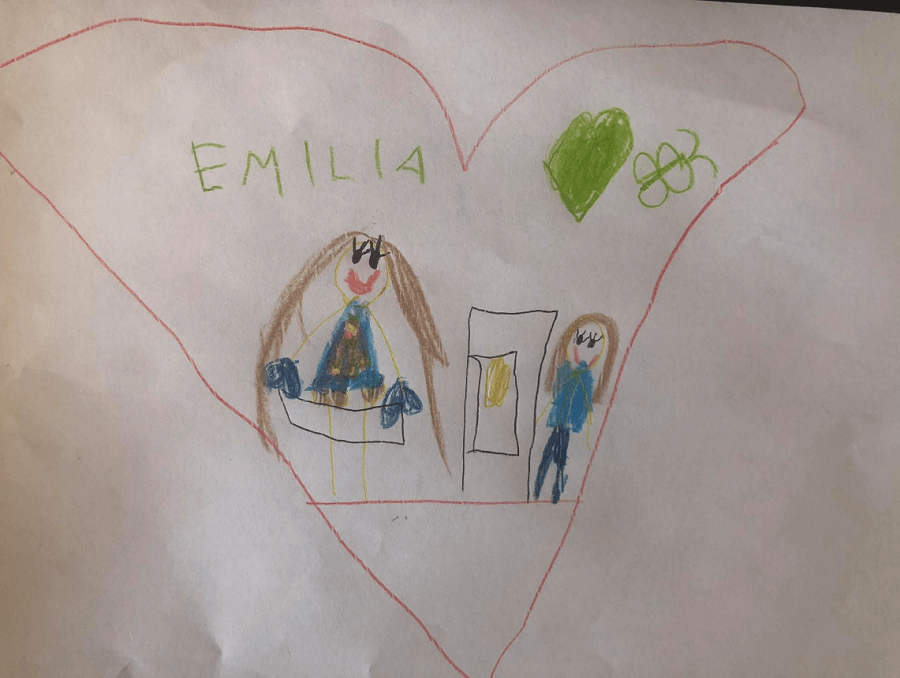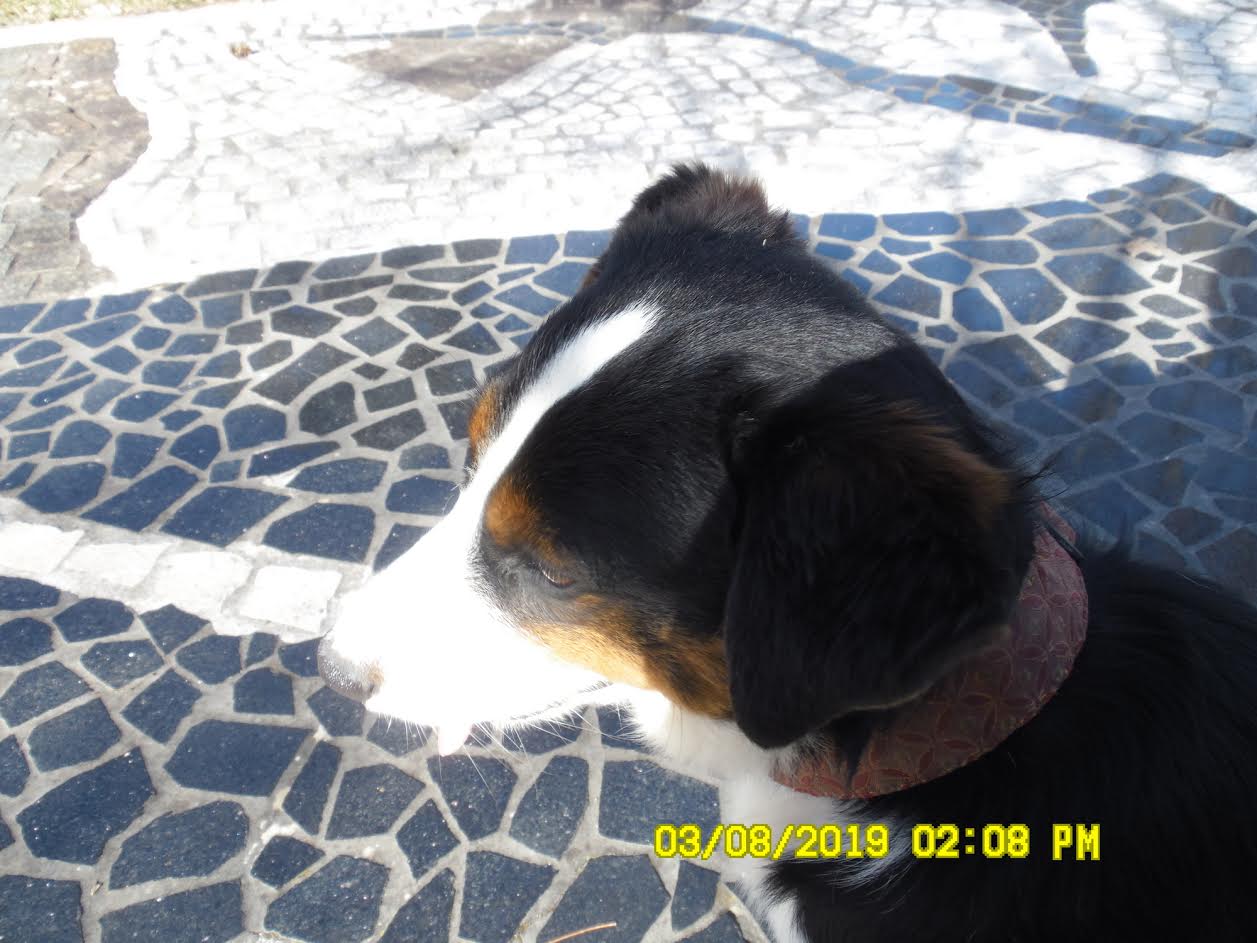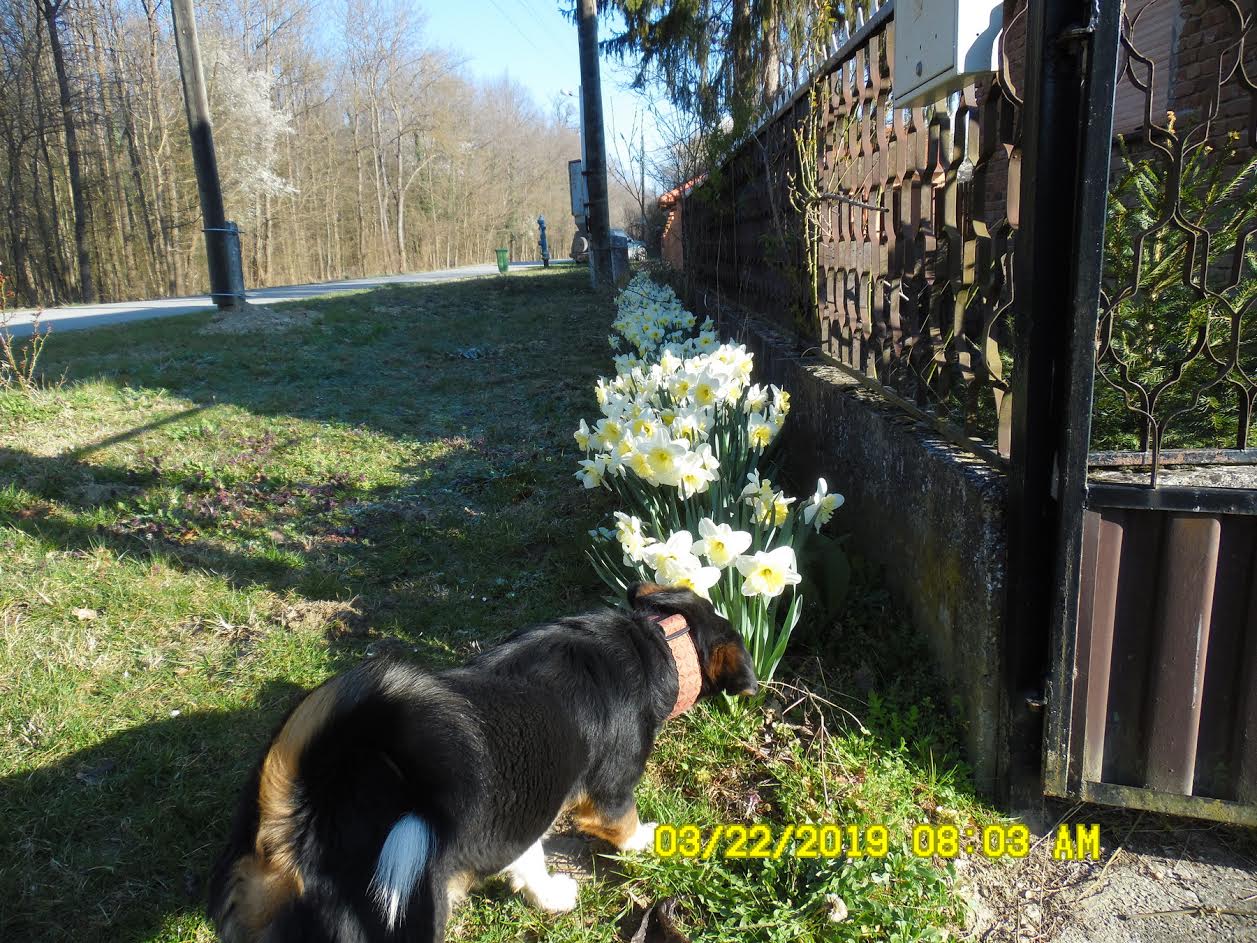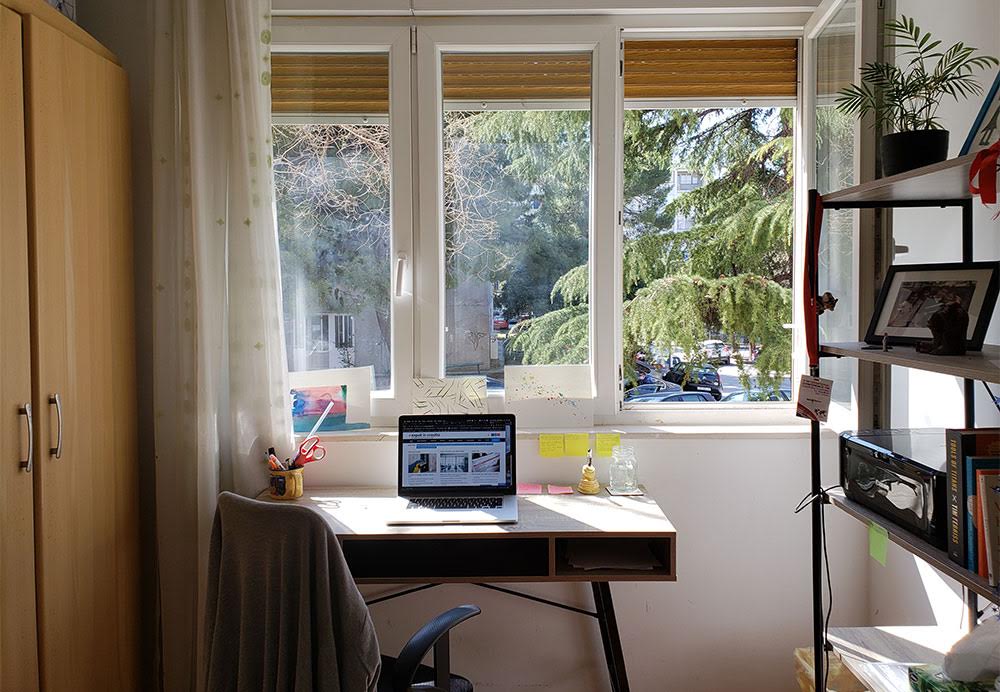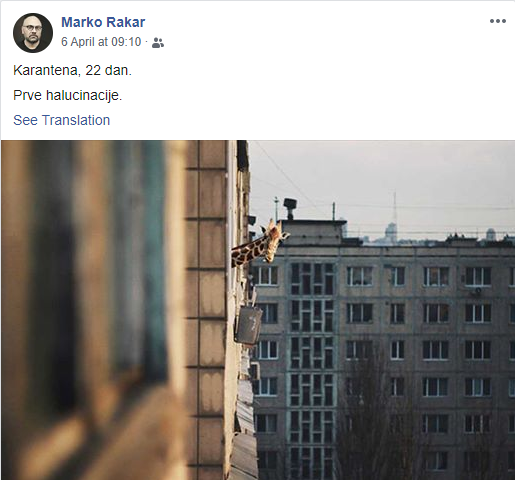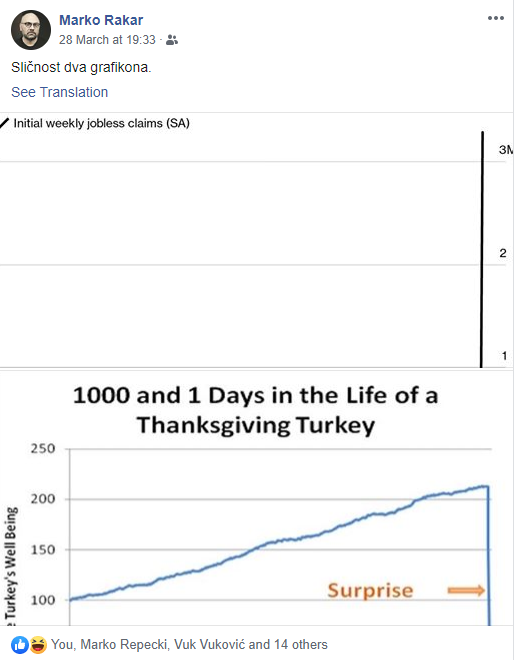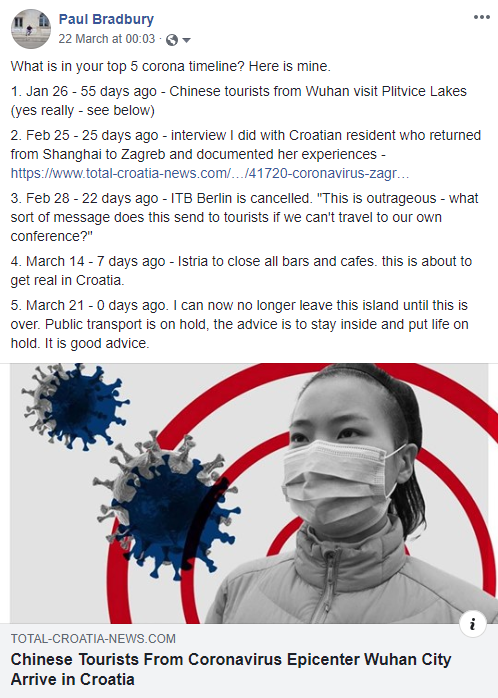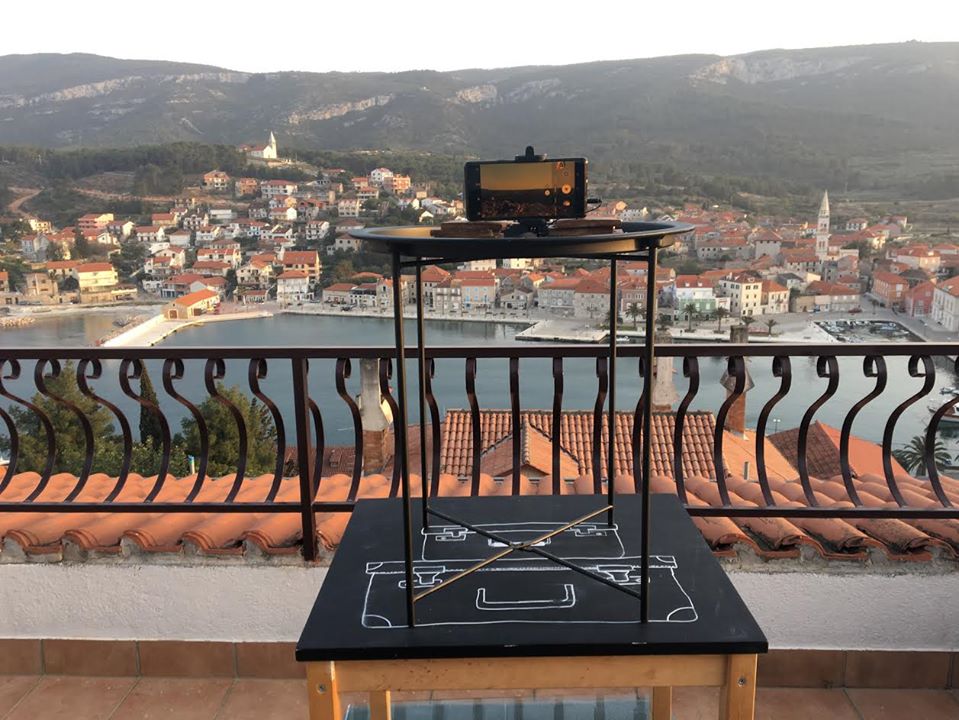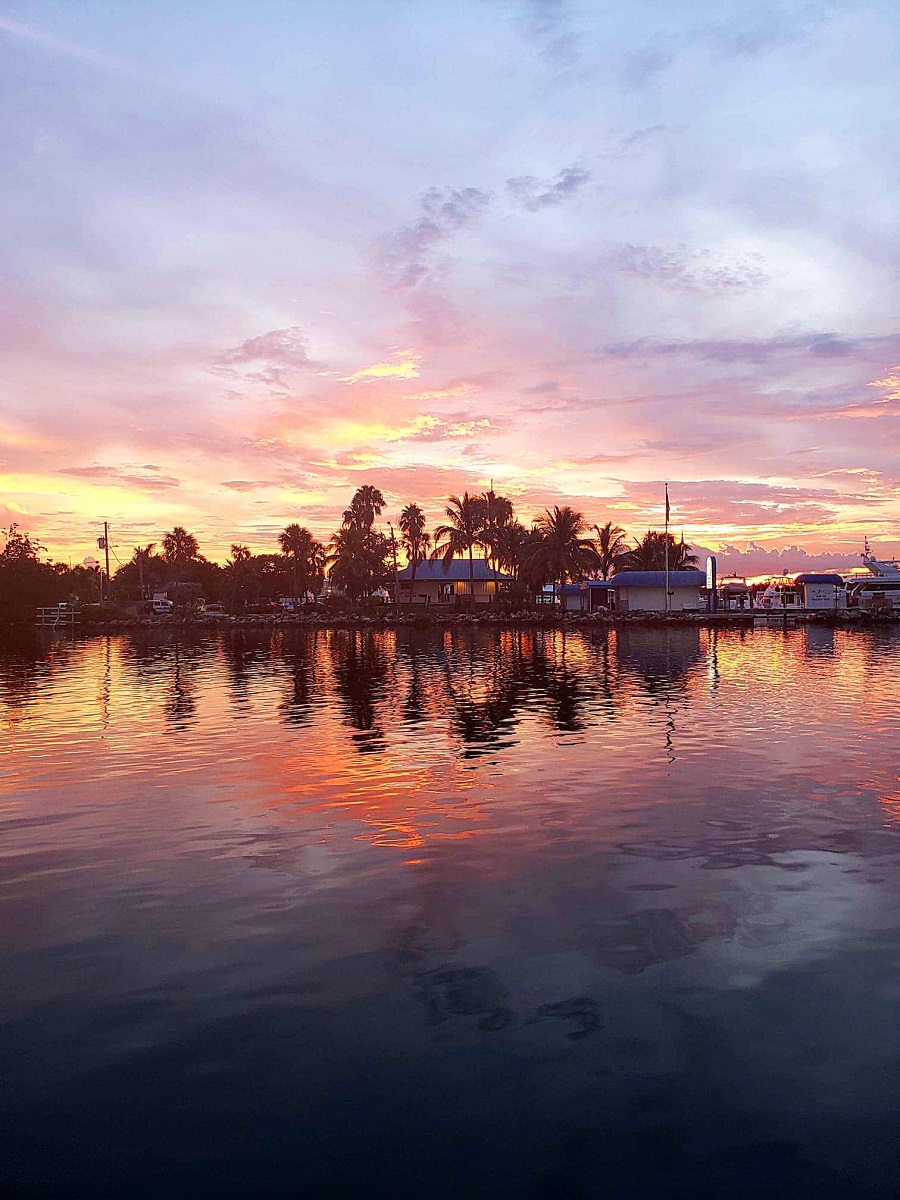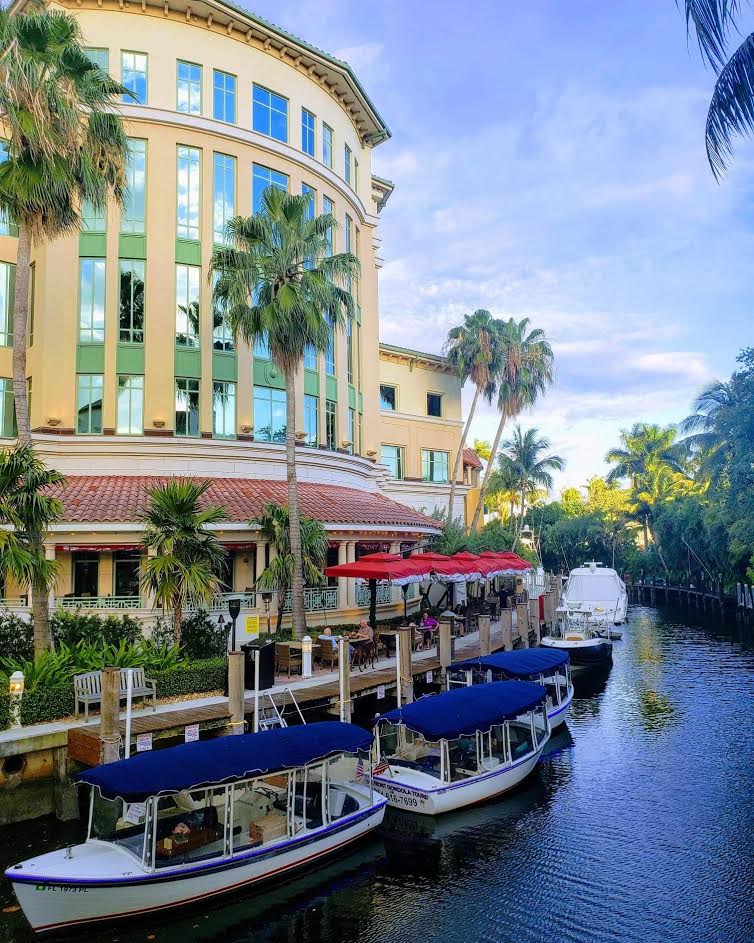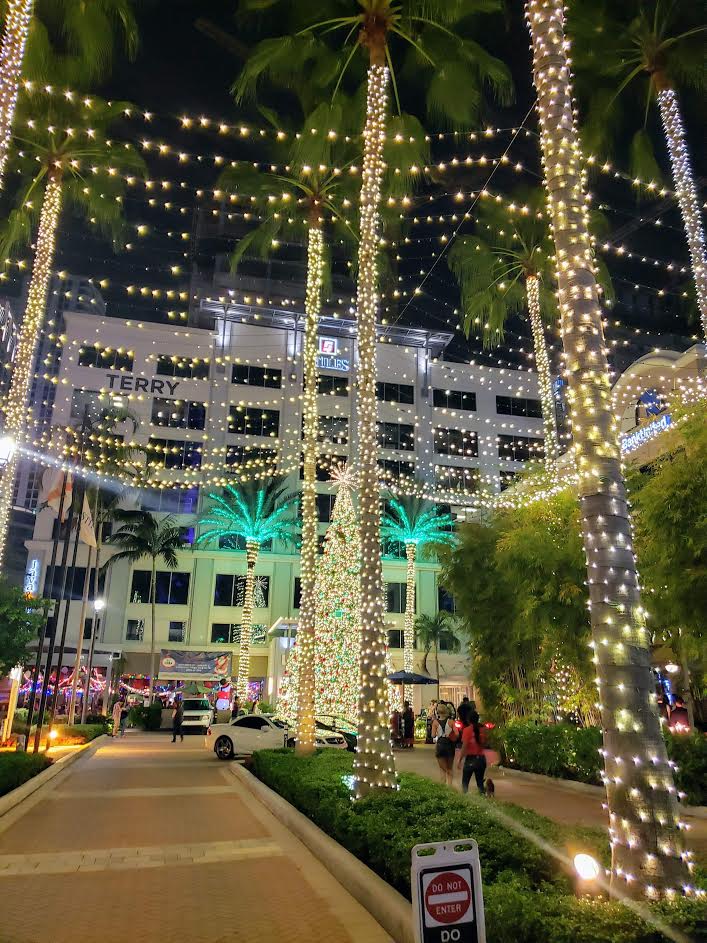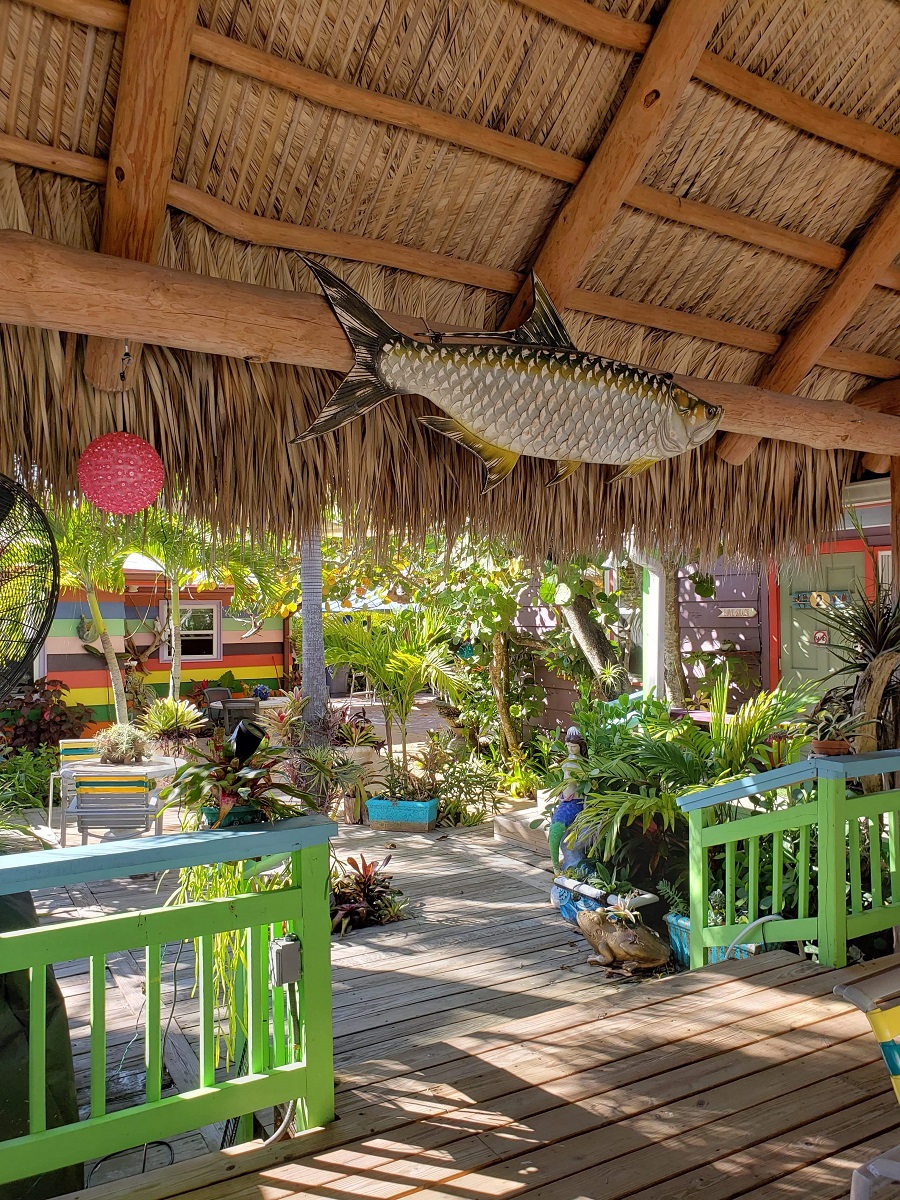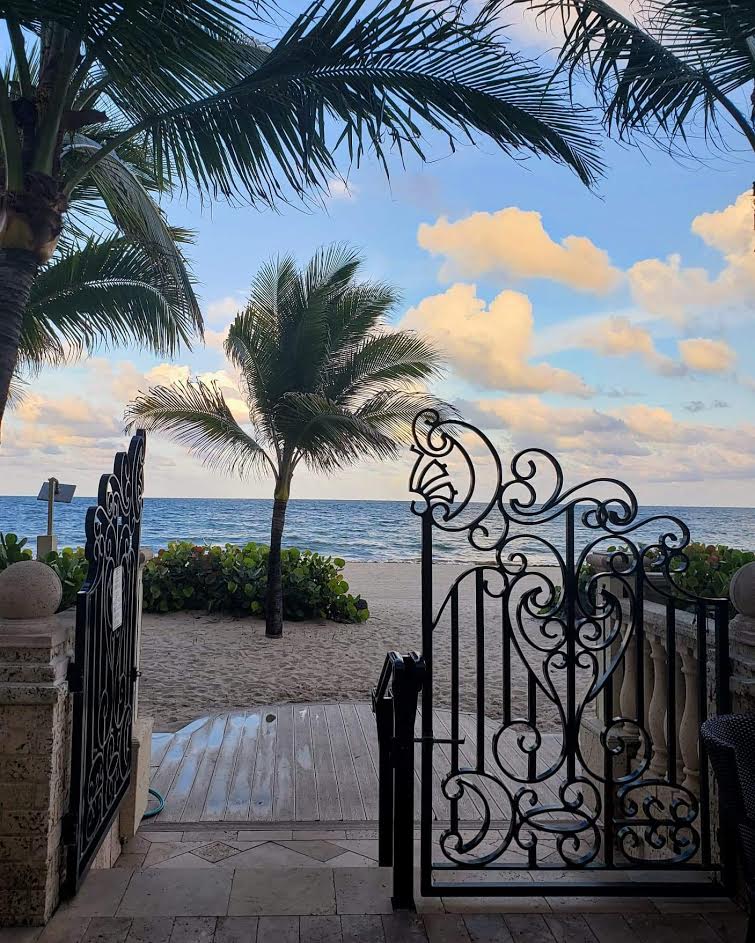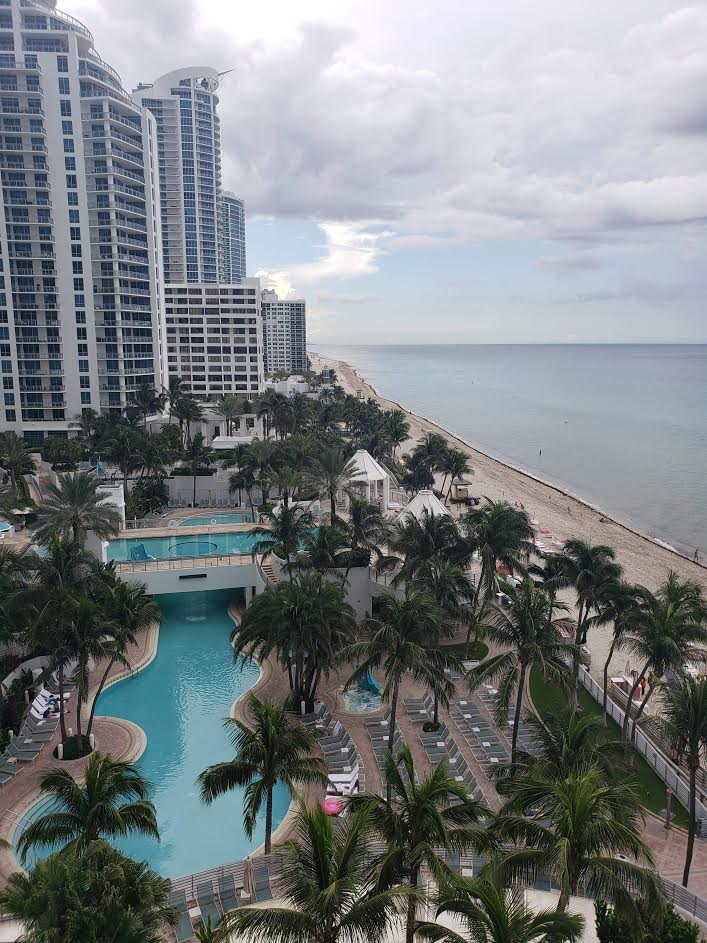COVID-19 Repatriation Stories: Singapore to Mauritius, South Africa & Zagreb
April 13, 2020 - With the sudden lockdowns and flight restrictions last month, there were many desperate COVID-19 repatriation attempts. Read how Bojan Mirkovic's idyllic 3-week African holiday from Singapore turned into a very different 3-week African experience ending in an unexpected return to his homeland.
From the TCN inbox on Easter Sunday.
Spring break is a time of the year when we choose to travel to destinations at the top of our bucket list. For Spring break 2020 plan was to visit the African continent finally. Our three-week itinerary originally was:
Singapore ➡️ Mauritius ➡️ South Africa (Cape Town) ➡️ Namibia ➡️ Zambia ➡️ Botswana ➡️ Zimbabwe ➡️South Africa (Johannesburg) ➡️ Singapore.
I spent at least a hundred hours last November by computer to properly plan this entire trip, choose destinations, make all the visas and book all the flights, hotels, rent-a-cars, day trips...(I considered it more like a project than a trip).
By the time we are heading to Mauritius, the situation with COVID-19 in Singapore was stable, and life went on as usual. Also, at that time, there was no Coronavirus in the Southern part of the African continent at all. All the countries we were planning to visit had zero cases. Africa seemed to be spared by this enemy.
Of course, we were all the time closely monitoring what was going on with the virus in our home countries, in Europe in general, and other parts of the world where numbers of confirmed cases were growing rapidly. So we made plan B...and C...just in case something went wrong.
We landed safely in Mauritius, enjoyed exploring a paradise island, and really had a blast on gorgeous beaches and resorts around the country. After a couple of days, the situation started changing fast. The virus came to the island. Apparently, two tourists that came from the last cruise ship had no symptoms but were carrying the virus. They spread it to their local tour guy, who went to a local funeral....numbers started growing fast, and the country went into lockdown. ??
We wanted to come back immediately to Singapore and cancel the rest of our African adventure. But that wasn't possible anymore. At the same time, the situation with COVID-19 in Singapore wasn't stable anymore. There was a spike, and everything changed, so the government implemented a lot of new measures to fight the spread of the virus. One of those was that all foreigners returning to Singapore must get approval first from the Ministry of Manpower before returning. We immediately started working on it and submitted all the forms. But our approval was rejected. Too many people were trying to get back. We kept trying....did it all over again every single day, wrote to the Ministry of Manpower, tried with the appeal as well. But no - it was still rejected.
Meanwhile, we managed to leave Mauritius with the last possible flight! The government was shutting down not just restaurants, bars, and hotels, but the airport as well! The destination was Cape Town. And it seemed great. Anyway, we had visas, booked accommodation, life there was going normal, and it was still a period before the crisis. Just like on Mauritius the week before, we had a couple of days to enjoy the new destination. Great city, a lot of things to see and do, perfect weather, great restaurants....all good...we had time to go to the Cape of Good Hope, spend some time with African penguins, explore the city,...but then, the president announced lockdown of South Africa for three weeks and gave people two days to prepare for it! Again, restaurants, bars, hotels, airports, everything - shutting down. Only pharmacies and supermarkets would remain open.
Meanwhile, all these days, we constantly kept applying to get approval to come back to Singapore.
It took a lot of time, money, and effort but again we made new plans for leaving Africa. We even had three plane tickets at the same moment!
Second - we also had a ticket to go to Windhoek, Namibia, as part of our original itinerary. It was just before the lockdown of South Africa... But we were not able to board that flight either. Why? Namibia, that same day went to lockdown as well!
The third ticket was - to Zagreb, Croatia. The situation there at that time was chaotic. In addition to the fight with Coronavirus, my hometown was hit by several strong earthquakes! As we had no option, we decided to fly to Croatia.
So, between choosing to get stuck in Namibia, Dubai airport, or South Africa - we decided to stay in lovely Cape Town. We love the city. ??
Lockdown started. Luckily, we had fantastic accommodation - a beautiful villa with a nice backyard, swimming pool, excellent breakfast, and situated in the best part of the city. We chose this over any hotel as we wanted to stay at some nice and clean place with fewer tourists to reduce the risk of getting a virus. So we were ready to pay more for it. When we were booking it, we had no idea it was going to be for so many nights. The owners reduced the price as they knew we had no choice and what the situation was. In such a lovely place, days were passing fast and we had a great time. Many people told us that this country is not a safe place and that due to lockdown and events from the past, we can expect anything. Several of them stated that it would be a great thing to get a gun as we could expect many robberies and riots when people in the slums become hungry and desperate! It was actually the opposite; we felt safe and sound during our entire stay.
When the South African president announced lockdown, we contacted the Croatian embassy to register there so they knew that we were in SA, on which address exactly and to leave contact details in case something went wrong. The embassy in Pretoria was very responsive and helpful, we were in contact every single day. Meanwhile, the South African and German governments concluded an agreement about COVID-19 repatriation flights for German tourists and other European Union citizens. Thanks to the Croatian embassy, a few days later, on the 13th day of lockdown, we found our seats on a flight to Frankfurt! After three weeks in total in Africa, we were now in Europe. From Frankfurt, we took the only flight left operating to Croatia! This entire trip with the COVID-19 repatriation flight is an interesting separate story in itself, but about that some other time. This one is already long enough for Easter morning.
So here we are now - after a lockdown in Mauritius, lockdown in South Africa, we are doing a two-week self-isolation in Croatia.
We wanted three weeks in Africa - we got three weeks in Africa! (Be careful what you wish for)!
I haven't been home for the last five years, so after all of this, I am still smiling and feeling great! It was a trip we for sure will never forget!
Also, during the entire trip, we were 100% healthy. We are having 36.6
Happy Easter!
Foreigners Self-Isolating in Croatia: Do You Feel Safer? Natalia from Poland in Ogulin
April 12, 2020 - Do foreigners in Croatia feel more or less safe sitting out COVID-19 here than in their home country, and what are their experiences? A new series on Total Croatia News, with Natalia Zielinska from Poland in Ogulin as the 36th contributor.
Oxford University recently published some research on government responses to coronavirus which showed that Croatia currently has the strictest measures in the world. While inconvenient, this is a good thing in terms of reducing the spread of the virus, and I am certainly not alone in my admiration of the official Croatian handling of this crisis in recent weeks, both in terms of action and communication.
But what do other expats here think? And how does it compare with the response in their home country? Would they rather sit this one out here or there? A new series on TCN, we will be featuring expats from all over the world to see what their views are on life in corona Croatia rather than back home. So far we have heard from expats in Croatia from Romania, USA, Ireland, UK, Mexico, Argentina, Spain, Singapore, Holland, Canada, India, Hong Kong, Venezuela, Latvia, China, Honduras, Hungary, Moldova, South Korea, Japan, the Philippines and Germany. Next up, Natalia Zielinska from Poland in Ogullin.
If you would like to contribute to this series, full details are below this interview.
Hello, I’m Natalia. I have lived in Croatia permanently since 2013, I run a company here that deals with consulting, preparing and implementing EU projects. I run several projects aimed at developing entrepreneurship and entrepreneurial skills in Croatia. Unlike most people who are in this business, I chose Ogulin, a small mountainous town right between Zagreb and Rijeka, for my life destination.
Firstly, how are you? Are you alone/with someone? Tell us a little about your situation and sanity levels.
I'm fine now. I'm not alone, we have a family and our little children here, so I definitely don't miss being around people. Quite the opposite. At the beginning, I was quite angry, disappointed because things got out of control, and I followed all the news in Poland and Croatia with tension. The worst thing was the ignorance, the virus started to spread, we didn't know if it was really a threat or some worse form of the common flu. I’ve already come to terms with the situation, but I’m still abnormally concerned about my family in Poland.
What struck me most was the closure of the borders, Poland was the first to introduce these measures.
Then I realised that if something bad happens to my mum who is alone, then realistically I can't even get to her, this feeling of powerlessness is terrible. But now that the situation is stabilising and we know, roughly, what’s going on around us.
So, in my private life, I’m now stable, I’m even enjoying this new rhythm where I’m constantly surrounded by children.
I went through the same stages in business - disappointment, anger and slowly getting used to the situation. Now, I’m continuing doing business peacefully, but I’m also increasingly trying to help and support other entrepreneurs who are in a bad situation.
In addition, I’m adapting to this new situation, developing an online business, focusing on our long-term partners, our clients. We’re building a relationship, we’re no longer interested in short-term earnings. Currently, we’re spending more time and resources on volunteer work, counselling and support than we are on commercial activities, which may not be good business sense, but these times have shown that we are dependent on each other.
What do you think about the economic measures the government is taking, are they helping your business?
The first measures were not sufficient, but all thanks to the Voice of the Entrepreneur (movement) and other branch organisations, things were organised in time to find better conditions.
For now, these existing measures are more than good, I personally just care about the background, that is, how the state will be able to finance these measures, because we’re aware of the inefficiency of the public sector.
Each day, we have 20-30 inquiries regarding government measures, grants and loans.
Each day we submit 10 applications for working capital loans.
I can say that the crisis that has emerged will further purify this sector, in the way that there are entrepreneurs who are struggling for their businesses and employees, and we have some who are immediately retiring to protect their interests. I think that in a few months, we will return to a full and healthy environment, a digitised public sector, hopefully deprived of parasites, but on top of that, better quality, more resourceful and loyal entrepreneurs will somehow be winners in the whole situation.
A decision has been made to limit public procurement, which is explicitly detrimental to the economy, but I hope this decision will not apply to EU projects, which are now the main wheel in re-starting the economy.
When did you realise that corona was going to be a big issue?
When they closed the borders, when for the first time someone restricted me, a child of Solidarity, the EU and the free market, the elemental freedom of movement. It's kind of a slight shock to us, ‘almost’ millennials.
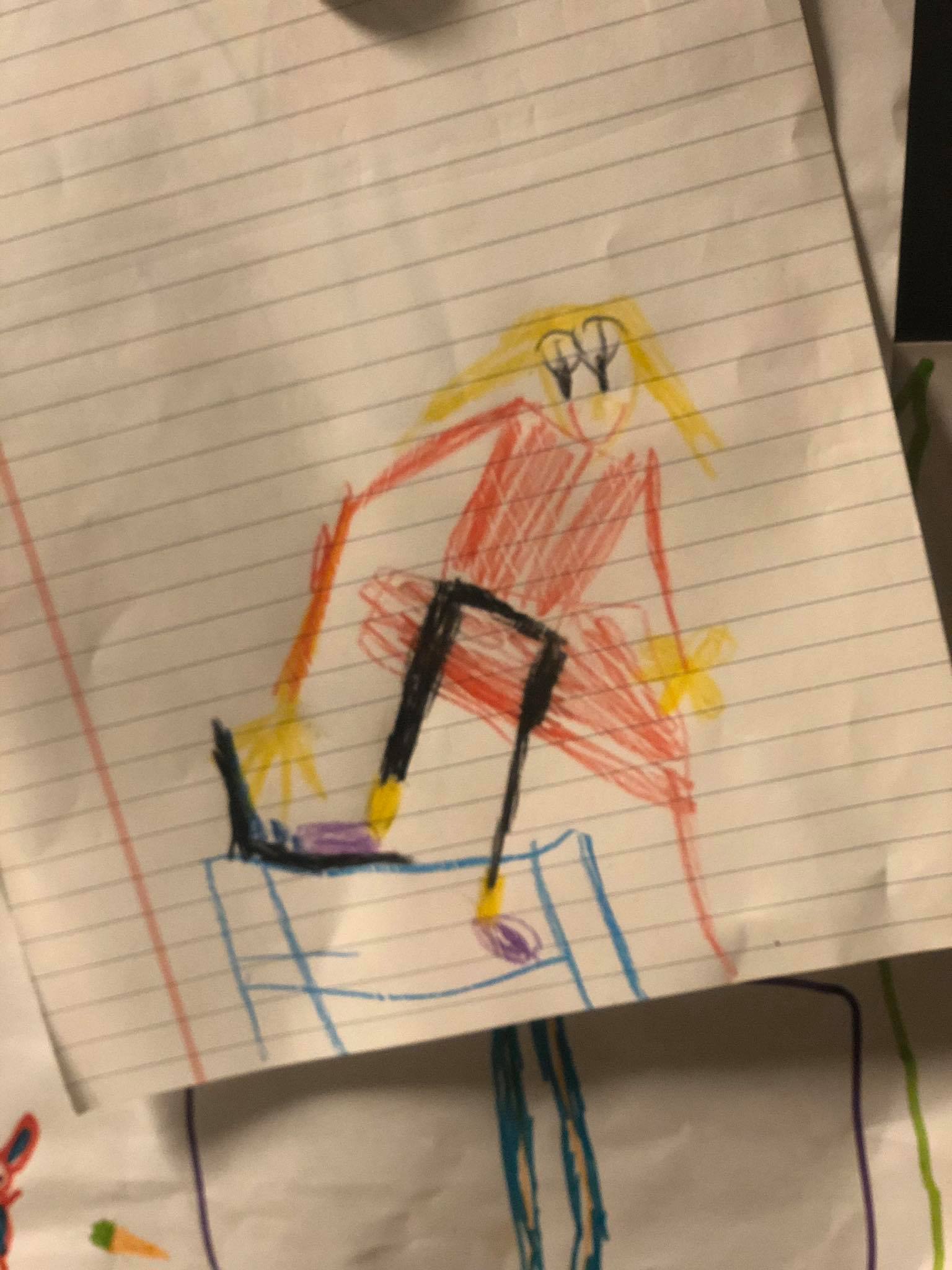
What is your impression of the way Croatia is dealing with the crisis? How safe do you feel?
The Croatian Government has put adequate measures in place in time. Communication is great, the organisation is too, the other day, the headquarters came to our apartment because we have Zagreb license plates [to check we were meant to be where we are]. Everyone really is doing their job. What concerns me are irresponsible citizens, on the one hand, they complain about the restriction of liberties, and on the other, they don’t know how to respect the elementary rules of conduct. That way, we keep going around in circles.
Now compare that to your home country and how they are handling it. What is Croatia doing better/worse?
Croatia definitely has better measures for entrepreneurs, for example, while for example, the Poles have better measures for the cultural sector, those who are self-employed and micro-entrepreneurs.
The Poles also introduced measures to further accelerate the implementation of investments such as exemptions from public procurement obligations for certain funds. A page has been created with all the measures and direct links for application, in Croatia, we have some announcements and additions to them every day. There is no single channel of communication.
In Poland, unfortunately, the ruling forces forcing the presidential elections in May are trying to take advantage of the situation. In addition, a number of legal measures are introduced, using a situation when everyone's attention is focused on the fight against COVID-19.
In Croatia, politicians behave correctly, I didn’t see anyone trying to score political points at the expense of the situation, finally, experts and those in the know joined the debate and subsequently organised the private sector.
In Poland, these initiatives are missing.
What's the one thing you wish you had taken with you into self-isolation?
My phone. To be able to hear from everyone and follow everything that happens.
What is one thing you have learned about yourself, and one thing you have learned about others during this crisis?
I’ve realised how much I’m missing out on the development of my children, since I’ve been working from home, watching them all the time, and only now am I understanding some of their behaviours, their rules. We have a much better relationship.
I always had it on my conscience that we had a bad business model because people, and their problems, were always my focus. Then many people assured me that the purpose of a business was to make a profit. When that profit disappears in one day, or one month, the people remain - business and life partners you can rely on. I think the crisis has convinced me only of the correctness of my views.
And secondly, I’ve not learned anything new, as there are always individuals who are struggling, they find solutions and they are great and inspirational people, and there is always a crowd that just criticises and senselessly discusses things.
These situations better highlight both categories of people, so it's a great opportunity to verify your friends and those on your list of business partners.
Thanks, Natalia. Stay safe and see you on the other side.
TCN is starting a new feature series on foreign experiences of sitting out COVID-19 here in Croatia compared to their home country. If you would like to contribute, the questions are below. Please also include a para about yourself and where you are from, and a link to your website if you would like. Please also send 3-4 photos minimum to This email address is being protected from spambots. You need JavaScript enabled to view it. Subject Corona Foreigner
If you would be interested to record a video version for our partners www.rplus.video please let us know in the email. Thanks and stay safe.
Foreigners Self-Isolating in Croatia: Do You Feel Safer Than in Your Home Country?
Firstly, how are you? Are you alone/with someone? Tell us a little about your situation and sanity levels.
What do you think about the economic measures the government is taking, are they helping your business? (PLEASE IGNORE IF THIS DOES NOT AFFECT YOU)
When did you realise that corona was going to be a big issue?
What is your impression of the way Croatia is dealing with the crisis? How safe do you feel?
Now compare that to your home country and how they are handling it. What is Croatia doing better/worse?
What about official communications from the authorities, compared to your home country?
What's the one thing you wish you had taken with you into self-isolation.
One thing you have learned about yourself, and one thing you have learned about others during this crisis.
TCN has recently become a partner in Robert Tomic Zuber's new R+ video channel, initially telling stories about corona experiences. You can see the first TCN contribution from this morning, my video from Jelsa talking about the realities of running a news portal in the corona era below. If you would like to also submit a video interview, please find Robert's guidelines below
VIDEO RECORDING GUIDE
The video footage should be recorded so that the cell phone is turned horizontally (landscape mode).
There are several rules for television and video news:- length is not a virtue- a picture speaks more than a thousand words
In short, this would mean that your story should not last more than 90 seconds and that everything you say in the report should be shown by video (for example, if you talk about empty streets, we should see those empty streets, etc.).
How to do it with your cell phone? First, use a selfie camera to record yourself telling your story for about a minute and a half. Ideally, it would be taken in the exterior, except in situations where you are reporting on things in the interior (quarantine, hospital, self-isolation, etc.). Also, when shooting, move freely, make sure everything is not static.
After you have recorded your report, you should capture footage that will tell your story with a picture, such as an earlier example with empty streets.
One of the basic rules of TV journalism is that the story is told in the same way as a journalist with his text. Therefore, we ask you for additional effort. Because we work in a very specific situation, sometimes you may not be able to capture footage for each sentence of the report. In this case, record the details on the streets: people walking, the main features of the city where you live, inscriptions on the windows related to the virus, etc.
The same rules apply if you are shooting a story from your apartment, self-isolation, quarantine. We also need you to capture footage that describes your story.
When shooting frames to cover your reports, it is important that you change the angle of the shot (in other words, shoot that empty street from several angles). Also, when shooting a detail, count at least five seconds before removing the camera to another detail.
The material should be about 5 minutes long (90 seconds of your report + frames to cover your story).
After recording everything, send us to Zagreb, preferably via WeTransfer to This email address is being protected from spambots. You need JavaScript enabled to view it.
Wash your hands.
Expats in Isolation Top 10 Croatia Experiences: Ionut from Romania in Split
April 12, 2020 - As people look for escape from the mental stress brought on by the corona crisis, a new series on TCN with local expats in isolation, looking back at their top 10 experiences in Croatia so far. We start with Ionut Copoiu from Romania in Split.
I have had a LOT of emails and messages asking if TCN could write about something happier than the constant corona updates. I hear your pain, but with so much (sadly bad) news to report and limited resources due to the crisis, this is not so easy. But then I thought of a nice series which might perhaps pique people's interests, focus on the happy stuff, and even unearth some hidden gems to explore at a later date.
Having done a very successful series with over 30 submissions from expats around the world on their self-isolation experiences in Croatia compared to what is happening in their home country, and then following that with a series on Croats in the diaspora with their corona viewpoint of their country of residence compared to the Homeland, perhaps a happier and more interesting series would be to look at expats here today and their top 10 experiences in Croatia so far.
We start in Split with Ionut Copiou from Romania, who has been here for 5 years now, running his own business making nautical jewellery with his wife, Mirela.
Here is Ionut's top 10. If would like to contribute to this series, contact us on This email address is being protected from spambots. You need JavaScript enabled to view it. Subject Top 10.
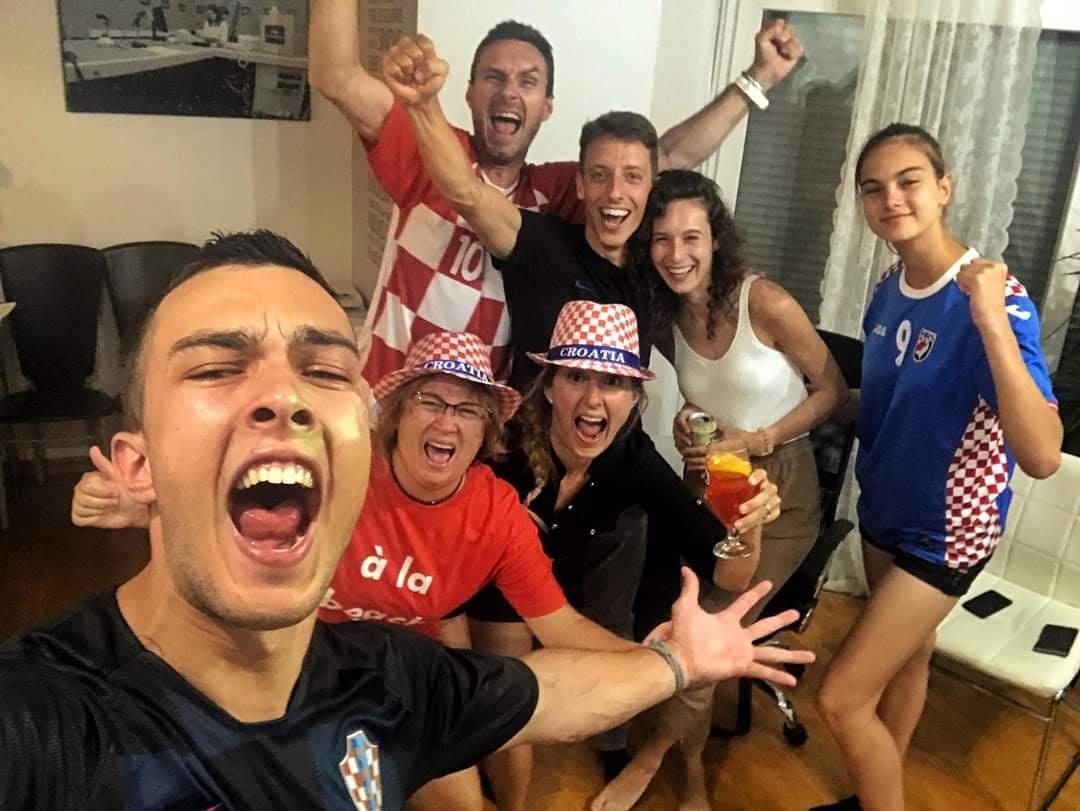
Living in Croatia during the 2018 World Cup is at the top of my list. Watching most of the games in the middle of the town surrounded by hundreds of Croatians and tourists and celebrating after each game in the streets - priceless! The game against England in the semi-final is still giving me goose-bumps.
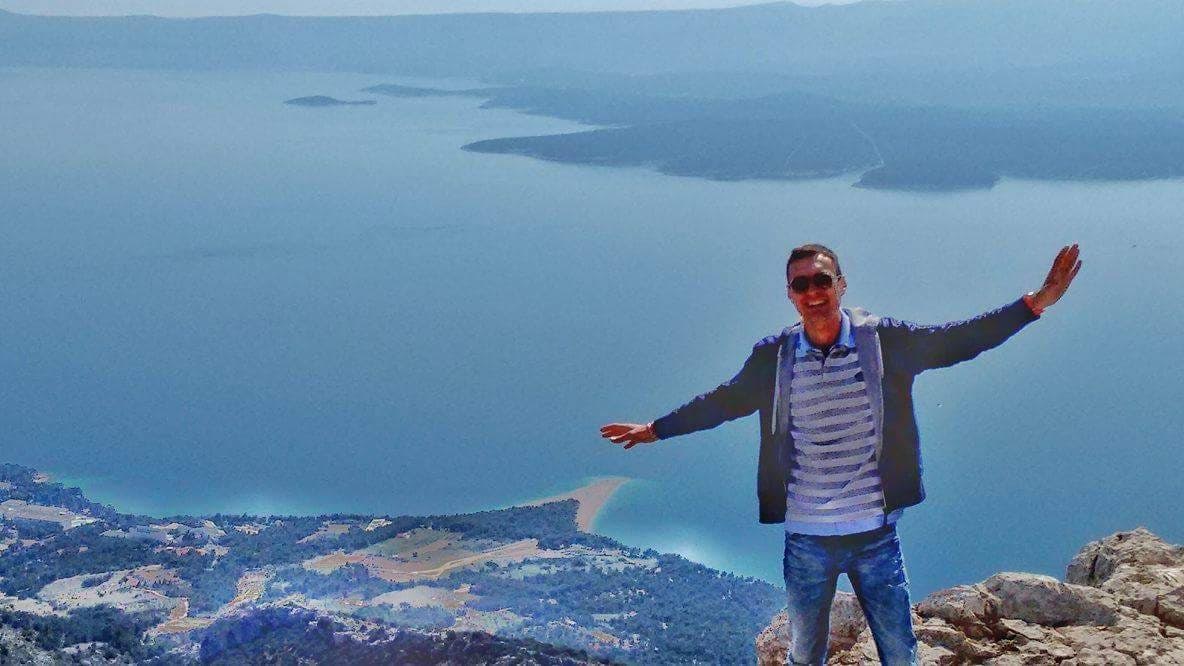
Visiting for the first Vidova Gora viewing point on the island of Brac was a breath-taking experience. The 180 degrees views of the blue waters of the Adriatic Sea and the islands gave me a feeling of being on top of the world.
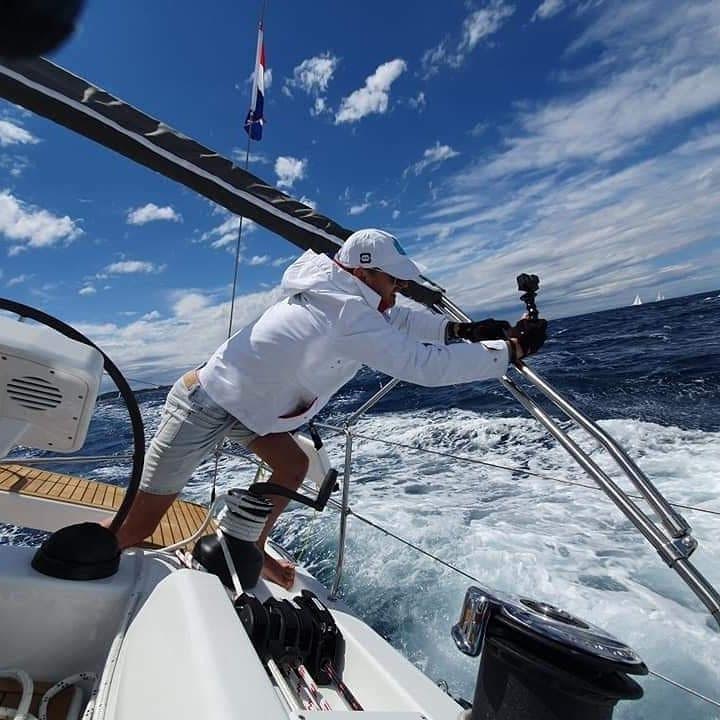
Being able to participate in regattas and experience sailing by competing with others while spending 5 days with good friends on a yacht.
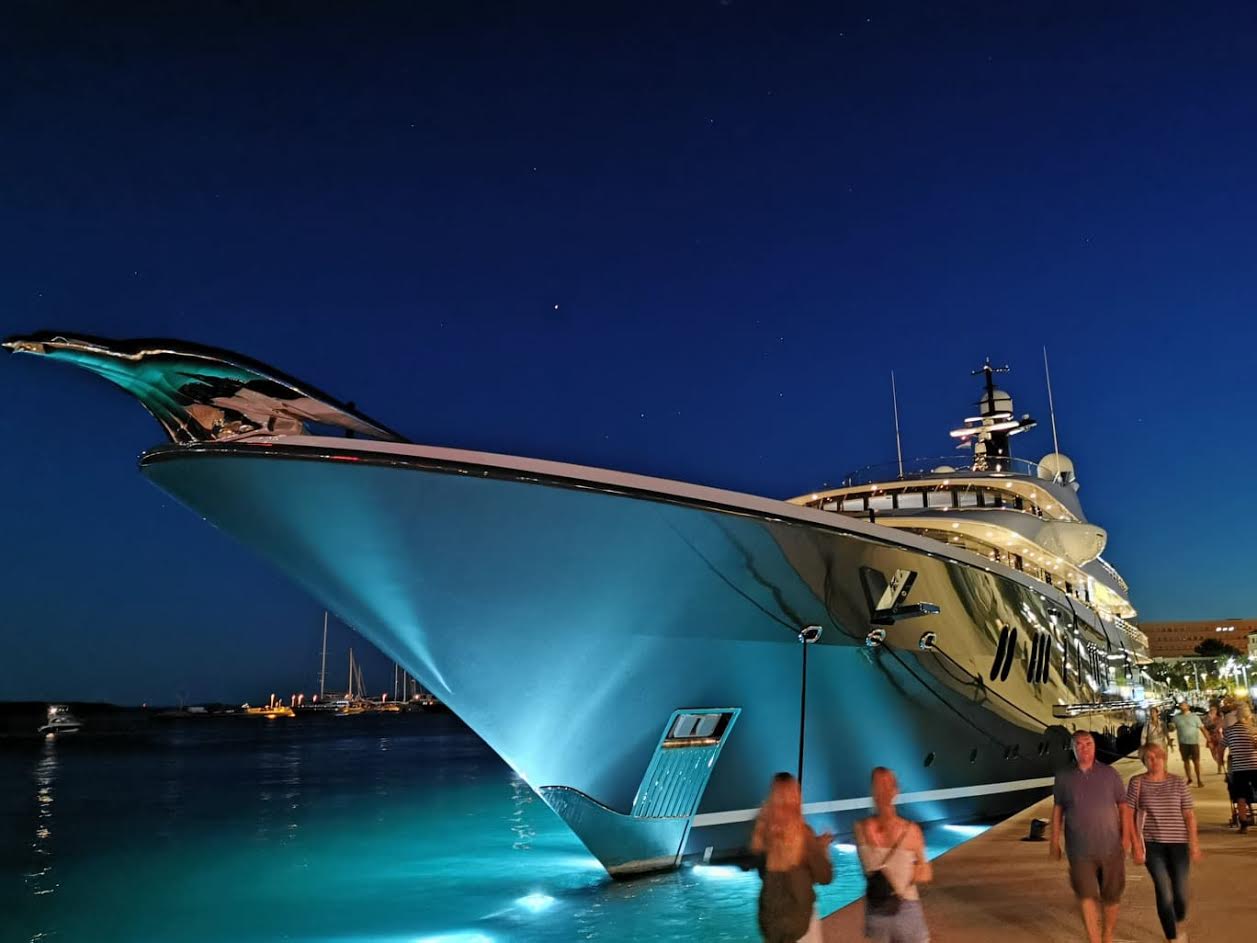
Exploring the west promenade of Split during the season and admiring luxury superyachts while having an ice-cold beer 10 meters away.
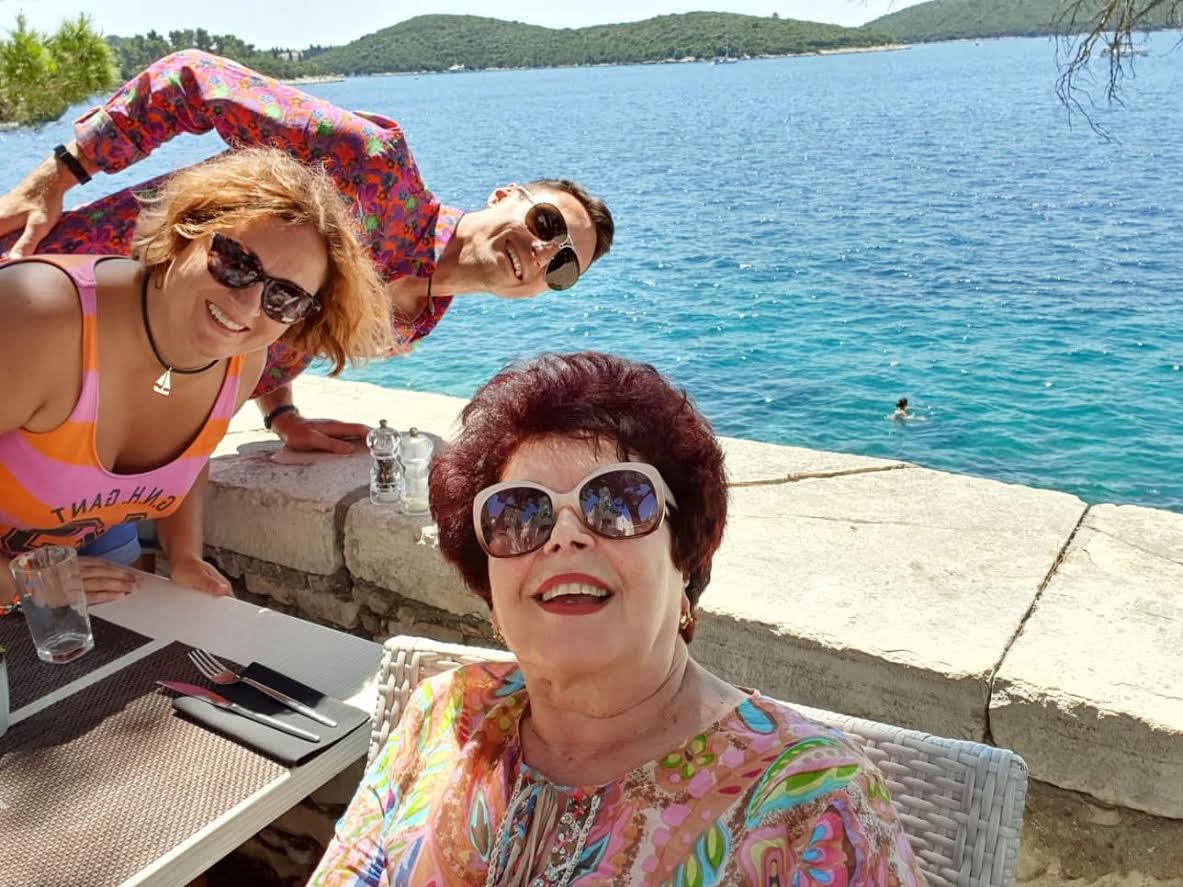
Bringing my parents over every year and build new memories is compensating for the fact that we now live 1500km away.
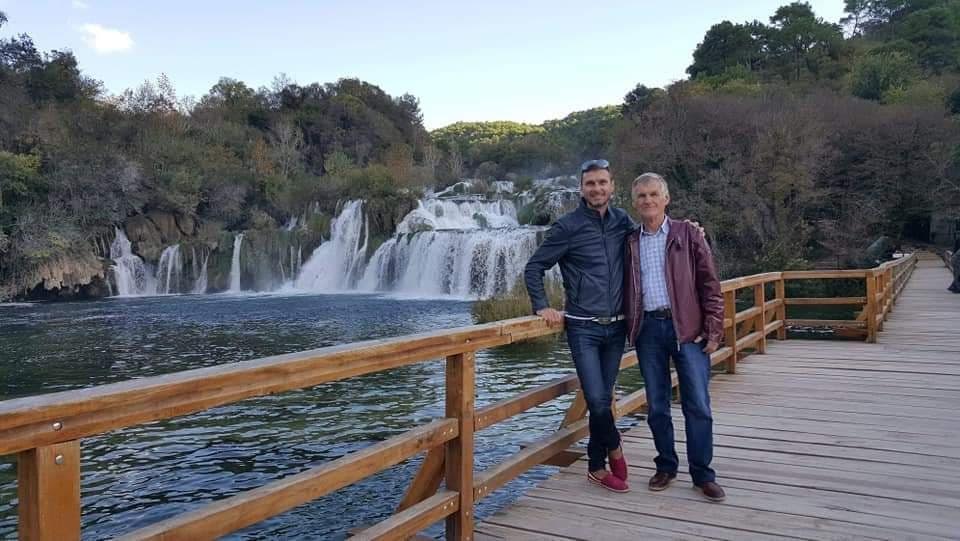
Waking up in the morning and having the possibility to jump on a yacht for a one-day sail and forget about work and current problems.
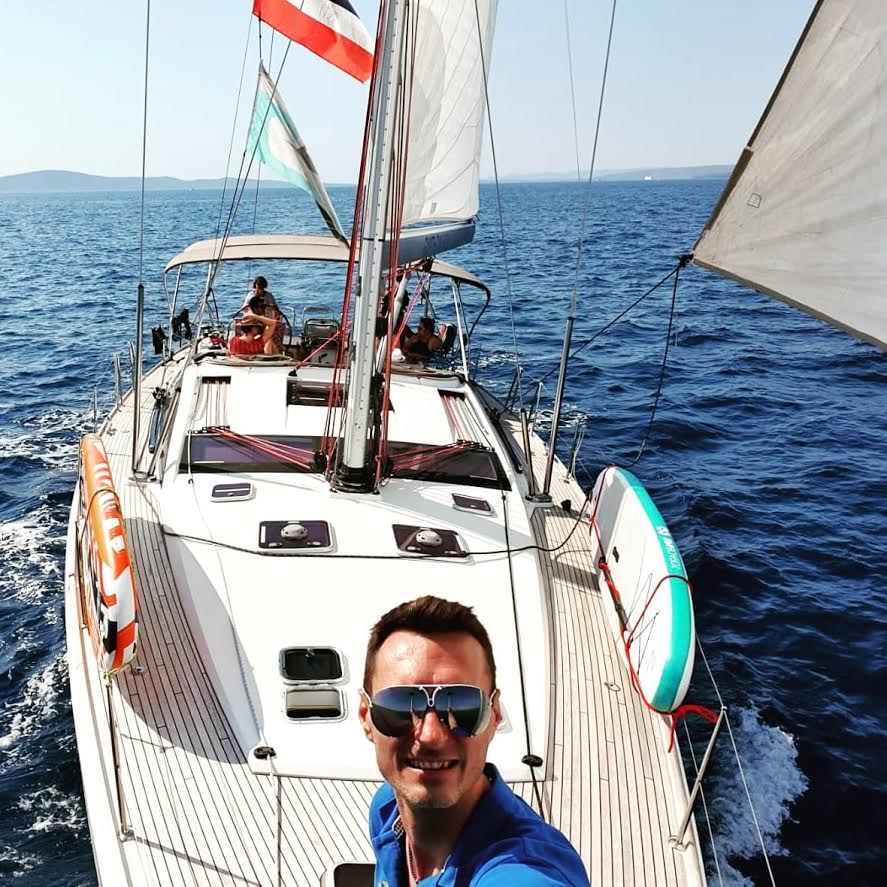
Celebrating New Year’s Eve in the old town of Split in the middle of the day each year, with artificial snow and music and all our friends.

Trips to Dubrovnik have always been a joy. One of the most beautiful coastal roads to get there from Split and once you are there, the Walls are every time very impressive.
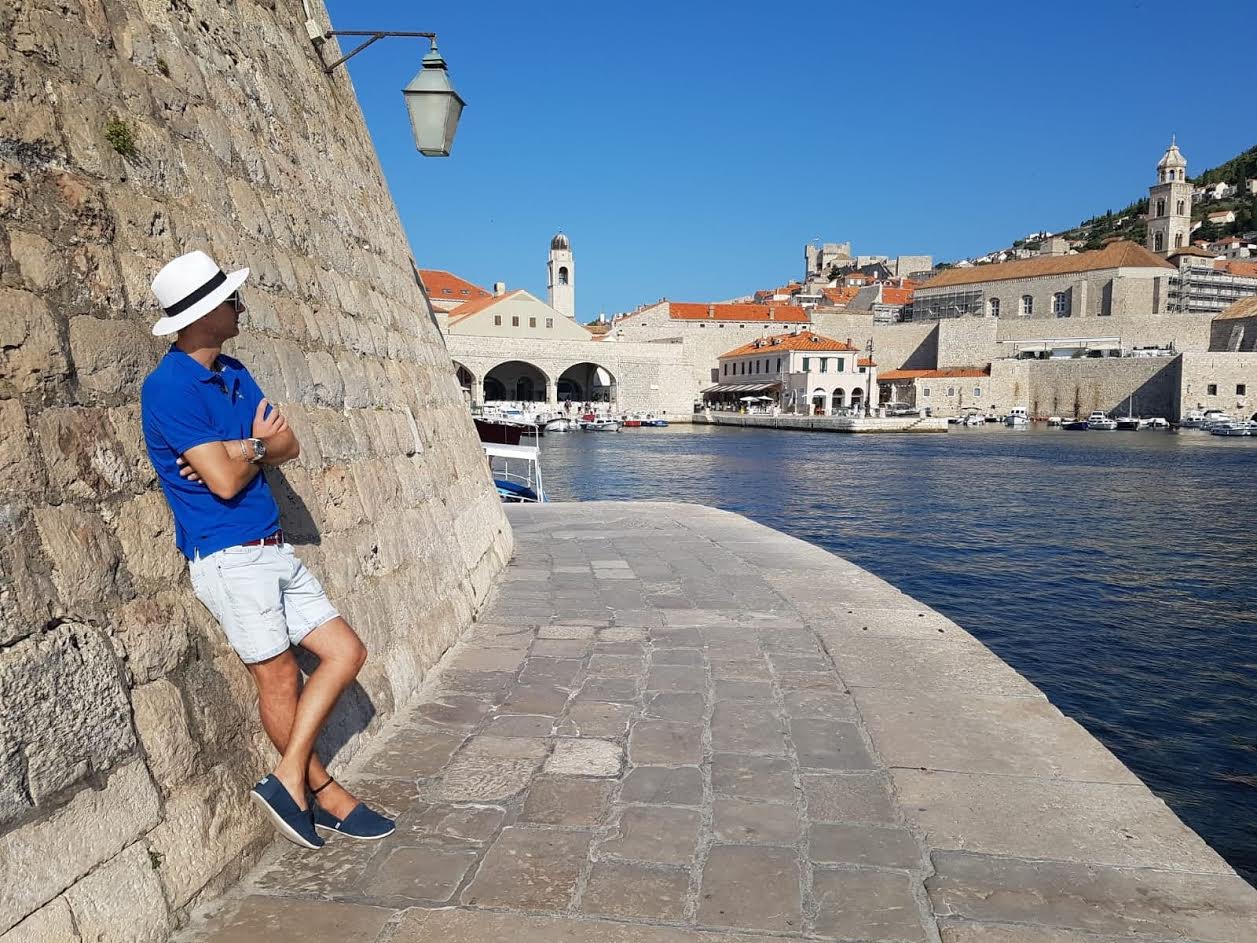
Being able to live in such a beautiful town like Split and walking almost every day in Diocletian’s Palace which is more 1700 years old...wow!
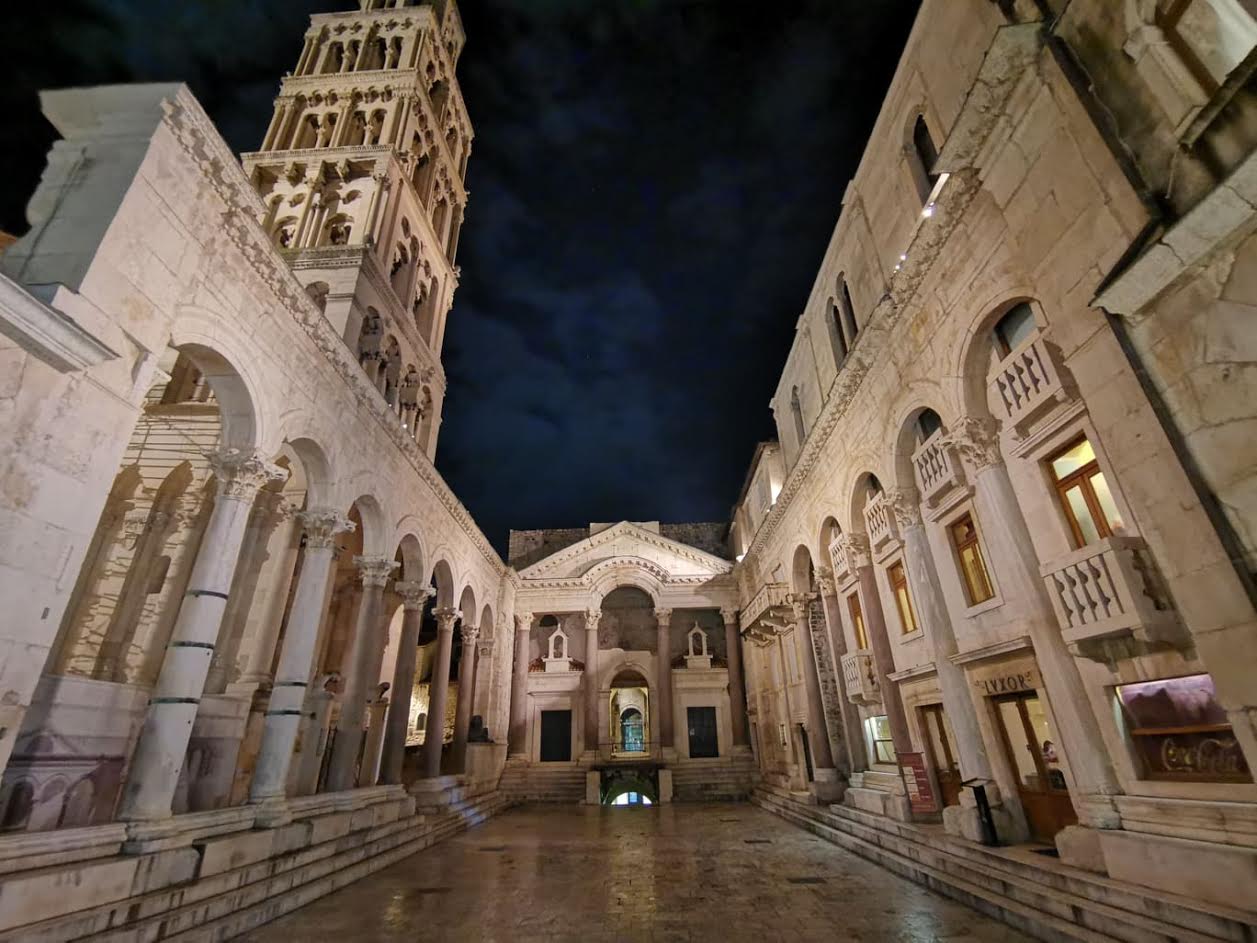
Seeing random people all over wearing the bracelets I make is still bringing me the same joy and excitement although is more than 4 years since this keeps happening. I hope it will never stop �
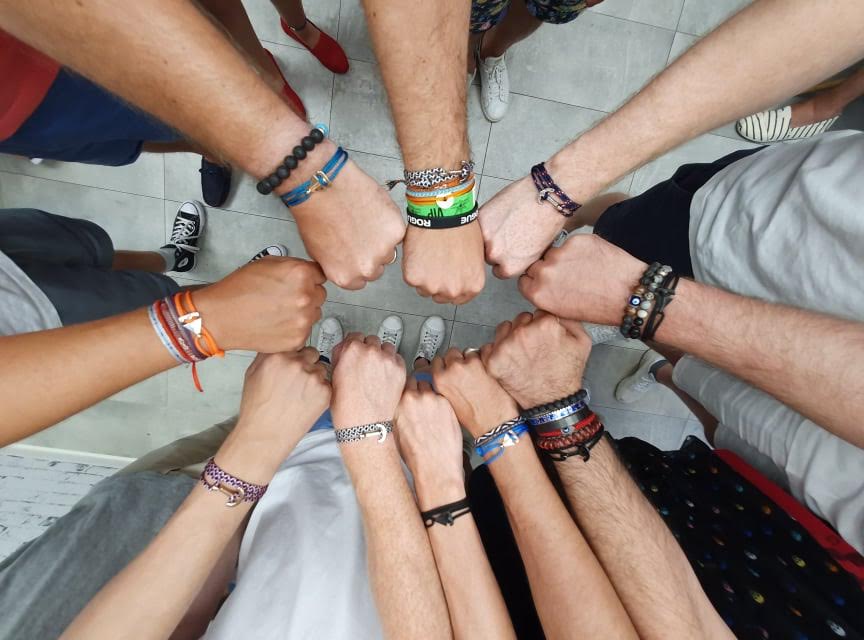
Thanks Ionut - it sounds like a fantastic life, and I am sure you will be back to it very soon when this madness is all over. If you would like to learn more about Ionut's fabulous nautical bracelets, visit his official website.
Are you an expat in Croatia with a little time on your hands and some fabulous memories and experiences to share? If you would like to participate in this series, please contact us at This email address is being protected from spambots. You need JavaScript enabled to view it. Subject Top 10.
To see the other stories in this series, as well as expat self-isolation stories compared to their home countries, and corona voices in the diaspora, visit the dedicated section.
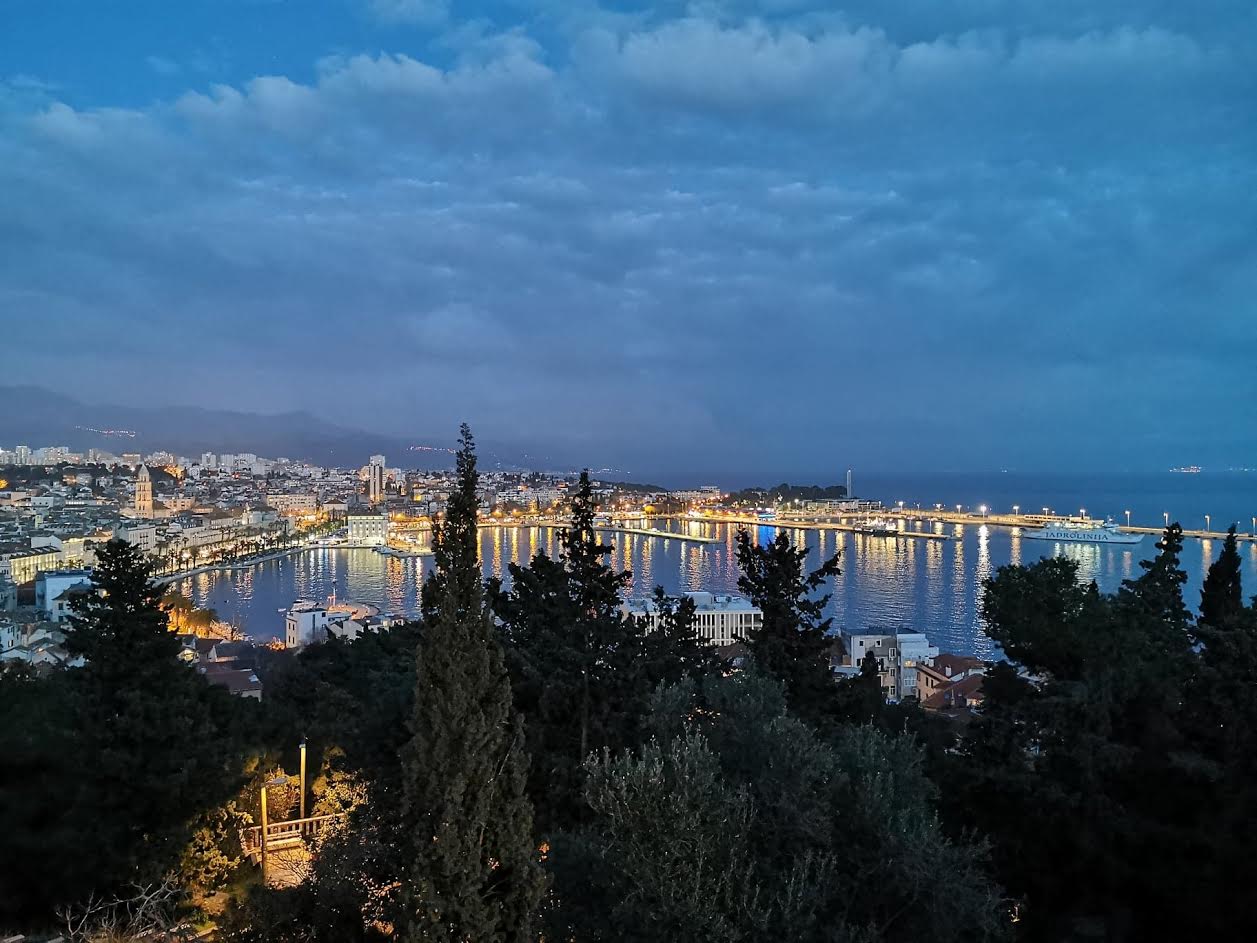
Corona Voices in the Croatian Diaspora: Ana from Dalmatia in Queens, New York
April 12, 2020 - With as many Croatians living abroad as in the Homeland, what are the diaspora experiences of self-isolation? In the sixth of a new series, Corona Voices in the Croatian Diaspora, here is Ana at the centre of the pandemic in Queens, New York City and originally from Dalmatia.
Last week TCN started a feature series called Foreigner Self-Isolation In Croatia: Do You Feel Safer? I can honestly say we have never had such a response or so many incredible contributions. The countries of origin of these expats in Croatia literally from all over the world. So far we have had submissions from expats from Romania, USA, Ireland, UK, Mexico, Argentina, Spain, Singapore, Holland, Canada, India, Hong Kong, Venezuela, Latvia, China, Honduras, Hungary, Moldova, New Zealand, Japan and Germany. You can see all their stories here.
Given the success of the series (still going strong) and large interest, it made sense to expand it to look at this from another angle - how Croatians abroad are coping where they are. If you would like to contribute your story to Corona Voices in the Croatian Diaspora, please find the submission guidelines below. And now, the view from the very heart of the pandemic. As Croatians celebrate Easter as best they can in these difficult times, spare a moment to think of Ana from a Dalmatian island, currently in Queens, New York City.
Firstly, how are you? Are you alone/with someone? Tell us a little about your situation and sanity levels.
When did you realise that corona was going to be a big issue?
When did you realise that corona was going to be a big issue in New York in particular?
Give us a timeline on when and how life changed.
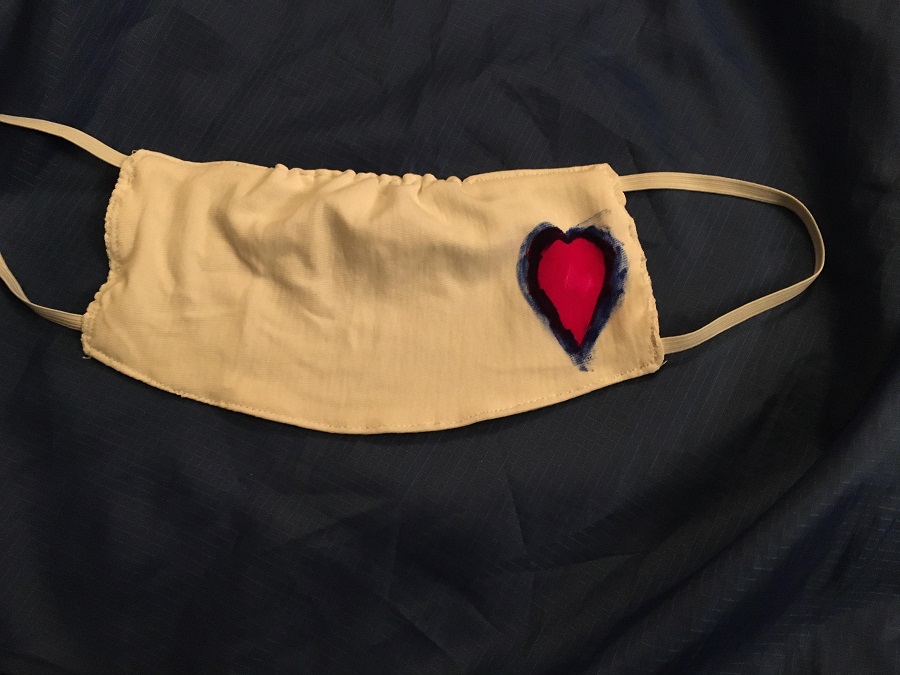
Tell us about your day. Do you/can you leave your apartment?
How are the authorities doing at handling the situation?
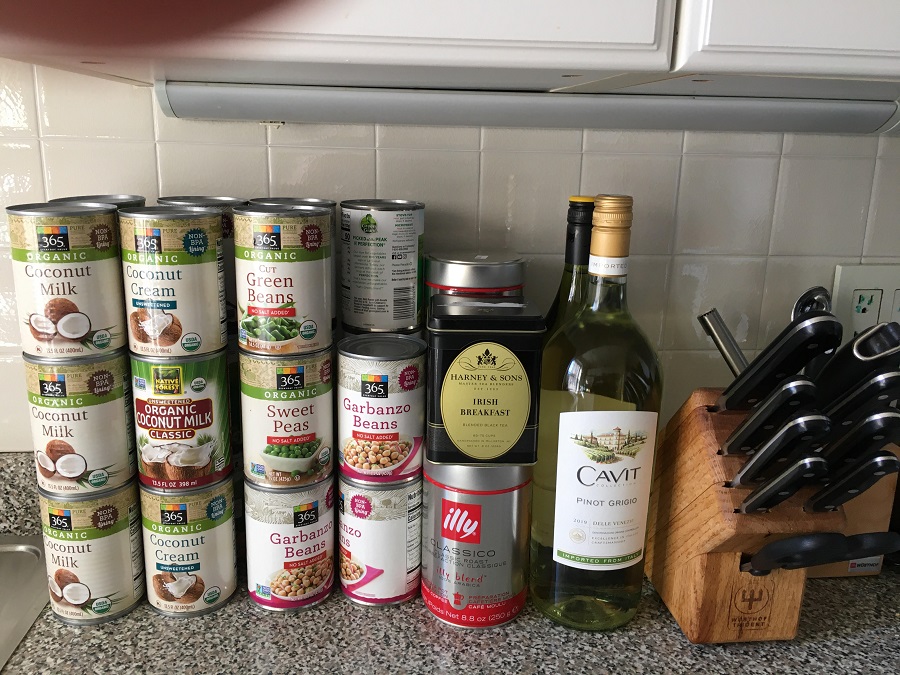
You obviously keep an eye on your homeland. What is your impression of the way Croatia is dealing with the crisis?
Compare and contrast the responses of Croatia and USA. Who is doing what better?
What about official communications from the authorities, compared to your home country?
What's the one thing you wish you had taken with you into self-isolation?
One thing you have learned about yourself, and one thing you have learned about others during this crisis.
If you could be self-isolating in Croatia, where would it be, and why?
Thanks, Ana. Stay safe and see you on the other side. You can see all the stories in both this diaspora series, and the one on expats in Croatia on this link.
TCN is starting a new feature series on Croatian diaspora experiences of sitting out COVID-19 abroad and comparing your experiences to the situation in Croatia. If you would like to contribute, the questions are below. Please also include a para about yourself and where you are from, and a link to your website if you would like. Please also send 3-4 photos minimum to This email address is being protected from spambots. You need JavaScript enabled to view it. Subject Corona Diaspora
If you would be interested to record a video version for our partners www.rplus.video please let us know in the email. Thanks and stay safe.
Self-Isolation Voices from the Diaspora
Firstly, how are you? Are you alone/with someone? Tell us a little about your situation and sanity levels.
When did you realise that corona was going to be a big issue?
When did you realise that corona was going to be a big issue in New York in particular?
Give us a timeline on when and how life changed.
Tell us about your day. Do you/can you leave your apartment?
How are the authorities doing at handling the situation?
You obviously keep an eye on your homeland. What is your impression of the way Croatia is dealing with the crisis?
Compare and contrast the responses of Croatia and USA. Who is doing what better?
What about official communications from the authorities, compared to your home country?
What's the one thing you wish you had taken with you into self-isolation?
One thing you have learned about yourself, and one thing you have learned about others during this crisis.
If you could be self-isolating in Croatia, where would it be, and why?
TCN has recently become a partner in Robert Tomic Zuber's new R+ video channel, initially telling stories about corona experiences. You can see the first TCN contribution from this morning, my video from Jelsa talking about the realities of running a news portal in the corona era below. If you would like to also submit a video interview, please find Robert's guidelines below
VIDEO RECORDING GUIDE
The video footage should be recorded so that the cell phone is turned horizontally (landscape mode).
There are several rules for television and video news:- length is not a virtue- a picture speaks more than a thousand words
In short, this would mean that your story should not last more than 90 seconds and that everything you say in the report should be shown by video (for example, if you talk about empty streets, we should see those empty streets, etc.).
How to do it with your cell phone? First, use a selfie camera to record yourself telling your story for about a minute and a half. Ideally, it would be taken in the exterior, except in situations where you are reporting on things in the interior (quarantine, hospital, self-isolation, etc.). Also, when shooting, move freely, make sure everything is not static.
After you have recorded your report, you should capture footage that will tell your story with a picture, such as an earlier example with empty streets.
One of the basic rules of TV journalism is that the story is told in the same way as a journalist with his text. Therefore, we ask you for additional effort. Because we work in a very specific situation, sometimes you may not be able to capture footage for each sentence of the report. In this case, record the details on the streets: people walking, the main features of the city where you live, inscriptions on the windows related to the virus, etc.
The same rules apply if you are shooting a story from your apartment, self-isolation, quarantine. We also need you to capture footage that describes your story.
When shooting frames to cover your reports, it is important that you change the angle of the shot (in other words, shoot that empty street from several angles). Also, when shooting a detail, count at least five seconds before removing the camera to another detail.
The material should be about 5 minutes long (90 seconds of your report + frames to cover your story).
After recording everything, send us to Zagreb, preferably via WeTransfer to This email address is being protected from spambots. You need JavaScript enabled to view it.
Foreigners Self-Isolating in Croatia: Do You Feel Safer? Joe From Queens, New York City on Iž
April 11, 2020 - Do foreigners in Croatia feel more or less safe sitting out COVID-19 here than in their home country, and what are their experiences? A new series on Total Croatia News, with Joe Orovic from Queens, New York City on the Dalmatian island of Iz as the 35th contributor.
Oxford University recently published some research on government responses to coronavirus which showed that Croatia currently has the strictest measures in the world. While inconvenient, this is a good thing in terms of reducing the spread of the virus, and I am certainly not alone in my admiration of the official Croatian handling of this crisis in recent weeks, both in terms of action and communication.
But what do other expats here think? And how does it compare with the response in their home country? Would they rather sit this one out here or there? A new series on TCN, we will be featuring expats from all over the world to see what their views are on life in corona Croatia rather than back home. So far we have heard from expats in Croatia from Romania, USA, Ireland, UK, Mexico, Argentina, Spain, Singapore, Holland, Canada, India, Hong Kong, Venezuela, Latvia, China, Honduras, Hungary, Moldova, South Korea, Japan, the Philippines and Germany. Next up, TCN's Joe Orovic from Queens, New York City on Iž.
If you would like to contribute to this series, full details are below this interview.
Firstly, how are you? Are you alone/with someone? Tell us a little about your situation and sanity levels.
I recently picked up my stupid cat — the clumsy one constantly falling off the windowsill — glared into its chubby face and shouted, “You fool! How can you carry on as if nothing is wrong?!”
The other cat, the cunning one who gifts us dead mice and lizards, relaxed its brow in a judgmental stare. I pointed an accusatory finger in its smug face and said, “You better hope this passes, or you’ll have to eat dead seagulls to survive!” It started licking my finger.
I’m with my wife, our three dogs and two cats on an island off the coast of Zadar called Iž. It seems six out of the seven of us are handling this pandemic well.
Exactly one month ago, I started a 17-day battle with a mystery ailment. It felt COVID-ish, but was never tested.
Comparatively speaking, these seasonal allergies making my life miserable at the moment ain’t that bad! In fact, they offer a sense of normalcy.
My mental situation is, I think, every transplant’s situation: experiencing a double-dose of corona anxiety caused by monitoring the virus on multiple fronts. In my case, Croatia and New York City, where family and many of my closest friends sit at the core of the infected Big Apple.
I haven’t had a night of sound, restful sleep in almost two months. Which might explain my arguments with the cats. I tell myself that's normal. I'll worry if they start talking back.
When did you realise that corona was going to be a big issue?
When Dr. Li Wenliang died. The Chinese physician first warned about COVID-19 and was silenced by authorities. He was 34 years old.
If a new pathogen kills those trained to fight it, the rest of us must recognize our innate stupidity, cede control to professionals, and hope for a bit of luck.
What is your impression of the way Croatia is dealing with the crisis? How safe do you feel?
The more we learn about COVID-19, the more it seems Croatia enjoys natural advantages.
This virus feeds off the negative consequences of modern workdays and socio-economic disparities. You know, that sedentary, stressful routine filled with fatty meals, sugar kicks and no free time, all while navigating a densely populated city choked with pollution and avoiding its complex, costly healthcare system? That lifestyle leads to diabetes, hypertension, asthma, as well underlying and under-treated conditions that COVID-19 relishes.
In that respect, Croatia unwittingly drew a winning hand on nearly all fronts. The comparatively healthier lifestyle, diet, easier tempo, clean air (minus Zagreb), public healthcare system and the many patriotic Croats driving down population density by leaving — these all gave the authorities a good foundation to build upon.
I worry Croats will squander this advantage and succumb to silly character flaws: impatience, bravado, and reflexively declaring victory. Not to mention the thousands who’ll likely return from pollution-choked, densely-populated economic hubs across the continent.
I’ve been skeptical before and ended up wrong. And I hope in two weeks, I’ll look back at Easter weekend and say I was wrong again.
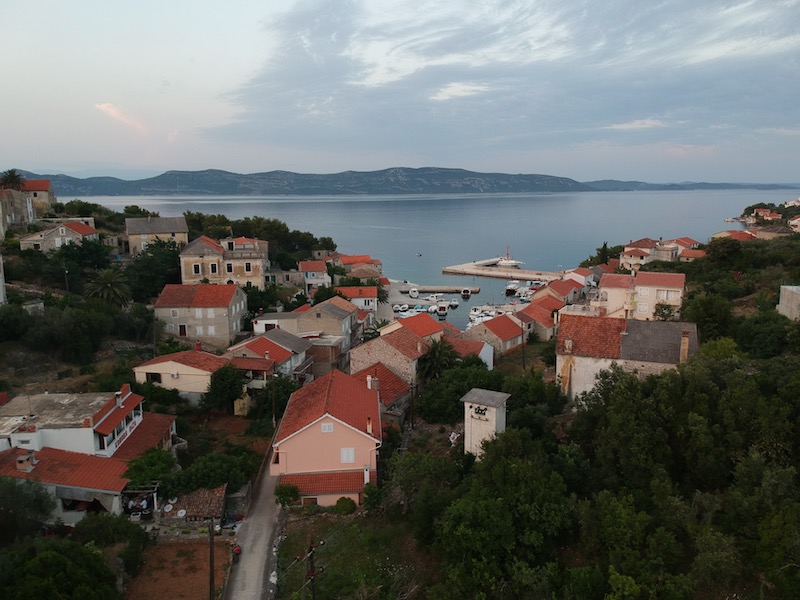
Mali Iž's port
Do I feel safe? Sure. The medical community continues to make superhuman sacrifices for everyone around them. That gives me hope.
Now compare that to your home country and how they are handling it. What is Croatia doing better/worse?
Let’s start with the better:
Croatia instituted preventative measures well ahead of time, increased the healthcare system’s capacity and stockpiled medical supplies. This made a world of difference.
Early on, politicians stepped aside and let medical professionals dictate healthcare policy, with economic policy following their lead. People as a result paid attention and, mostly, listened.
As a news junky, I have to commend the Croatian “media” — that perpetual whipping boy casually blamed for every societal ill in this country. It has never been as responsible and professional in its presentation of facts and diligent in reporting the successes and flaws in the government’s efforts. Most importantly, it’s avoiding the dangerous trap of giving time to "It's just like the flu" skeptics under the guise of “fairness”, something the US media continues to do.
This has, for now, stifled the small-yet-loud cult Croatian contrarians who think skepticism is the ultimate sign of intelligence. You know, those habitually hawking stories about fake moon landings, poisonous vaccines, chemtrails, “9/11 was an inside job”… etc. etc. etc. (Spare me the vitriolic comments and messages.)
The worse:
There is no government official shutting down talk of “life back to normal” and “loosening restrictions.” I understand the folly of constant uncertainty — it’s a political land mine. But the margin for error here is razor-thin.
The response to citizens’ economic hardships has been about the same — hodgepodge and, if you ask enough people, inadequate.
Enforcement of the self-isolation and travel restrictions is, at worst, reportedly non-existent and wholly relying on good faith.
The itch to salvage the tourism season seems to influence long-term projections. This "economy or health" debate exists on both sides of the Atlantic, despite studies showing they're actually inextricably intertwined — an ongoing pandemic does more economic damage than any measures stopping it.
Neither government is preparing citizens for the prospect of all this lasting into the autumn, which could happen if the medical community doesn't find quick testing methods and a stopgap treatment. Growing evidence also shows opening borders almost instantly starts another outbreak. Just ask Singapore, Hong Kong and Taiwan, which had the virus under control until they eased travel restrictions and allowed foreigners to enter. This is a heartbreaking, difficult conversation to have in a country married to tourism. “Your annual source of income may disappear” is a wrenching thing to say. But the sooner it occurs, the sooner people and the government can make provisions, just in case.
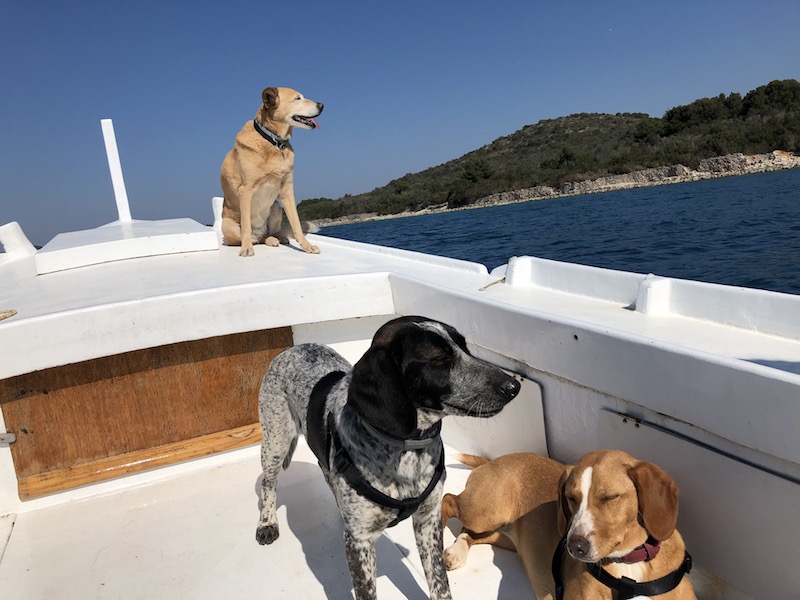
The author's COVID crew.
What about official communications from the authorities, compared to your home country?
Remember in grade school when the substitute teacher promised a reward if everyone just behaved for 10 more minutes? And then after ten minutes passed, the classroom turned into a zoo?
I get that same sensation when a member of Croatia’s Civil Protection Directorate says, “If things continue this way, we’ll be able to loosen restrictions.”
As for authorities, Croatia and the US have similar systems of decentralized power, passing enforcement and execution of national edicts down to the local level as often as possible. This leads to crossed signals.
When local directorates scuttle travel restrictions wholesale, as Istria did, one has to wonder who holds the ultimate authority. Is any of this coordinated, or voluntary?
You see much the same in the US, with governors dictating policy at a granular level, even though the coronavirus doesn’t recognize state borders.
What’s the one thing you wish you had taken with you into self-isolation?
My mother, who's riding this out in Queens, isolated at home under the constant din of blaring sirens.
One thing you have learned about yourself, and one thing you have learned about others during this crisis.
I’ve noticed two general responses to the crisis. One group sits on its hands, nervously hoping for things to go back to normal. The other smells an opportunity, while the rules are unclear and everyone’s distracted. Those scheming with novel plans might come out of this with a renewed sense of purpose and contentment. Some may even be successful.
I can say with certainty: the people handling this well don't spend much time on social media.
As for me? I see at least four crises: a pandemic, a strain on the healthcare system, an economic collapse and a mental health crisis. All are happening at once, but at various speeds. The first two are the most pressing now — getting the virus under control and keeping hospitals at capacity are the priority. But the latter two — economic and mental health — will be the lasting effects for everyone who survives this.
My relationship to all this changed when I accepted I can’t control the virus and healthcare systems beyond following the prescribed measure. But I do have some controls over the economics and mental health aspects, and working on those a little bit every day blunts the constant stream of bad news and simmering anxiety.
Mainly, I want to make sure the cats don't start talking back.
Thanks, Joe. Stay safe and see you on the other side.
TCN is starting a new feature series on foreign experiences of sitting out COVID-19 here in Croatia compared to their home country. If you would like to contribute, the questions are below. Please also include a para about yourself and where you are from, and a link to your website if you would like. Please also send 3-4 photos minimum to This email address is being protected from spambots. You need JavaScript enabled to view it. Subject Corona Foreigner
If you would be interested to record a video version for our partners www.rplus.video please let us know in the email. Thanks and stay safe.
Foreigners Self-Isolating in Croatia: Do You Feel Safer Than in Your Home Country?
Firstly, how are you? Are you alone/with someone? Tell us a little about your situation and sanity levels.
What do you think about the economic measures the government is taking, are they helping your business? (PLEASE IGNORE IF THIS DOES NOT AFFECT YOU)
When did you realise that corona was going to be a big issue?
What is your impression of the way Croatia is dealing with the crisis? How safe do you feel?
Now compare that to your home country and how they are handling it. What is Croatia doing better/worse?
What about official communications from the authorities, compared to your home country?
What's the one thing you wish you had taken with you into self-isolation.
One thing you have learned about yourself, and one thing you have learned about others during this crisis.
TCN has recently become a partner in Robert Tomic Zuber's new R+ video channel, initially telling stories about corona experiences. You can see the first TCN contribution from this morning, my video from Jelsa talking about the realities of running a news portal in the corona era below. If you would like to also submit a video interview, please find Robert's guidelines below
VIDEO RECORDING GUIDE
The video footage should be recorded so that the cell phone is turned horizontally (landscape mode).
There are several rules for television and video news:- length is not a virtue- a picture speaks more than a thousand words
In short, this would mean that your story should not last more than 90 seconds and that everything you say in the report should be shown by video (for example, if you talk about empty streets, we should see those empty streets, etc.).
How to do it with your cell phone? First, use a selfie camera to record yourself telling your story for about a minute and a half. Ideally, it would be taken in the exterior, except in situations where you are reporting on things in the interior (quarantine, hospital, self-isolation, etc.). Also, when shooting, move freely, make sure everything is not static.
After you have recorded your report, you should capture footage that will tell your story with a picture, such as an earlier example with empty streets.
One of the basic rules of TV journalism is that the story is told in the same way as a journalist with his text. Therefore, we ask you for additional effort. Because we work in a very specific situation, sometimes you may not be able to capture footage for each sentence of the report. In this case, record the details on the streets: people walking, the main features of the city where you live, inscriptions on the windows related to the virus, etc.
The same rules apply if you are shooting a story from your apartment, self-isolation, quarantine. We also need you to capture footage that describes your story.
When shooting frames to cover your reports, it is important that you change the angle of the shot (in other words, shoot that empty street from several angles). Also, when shooting a detail, count at least five seconds before removing the camera to another detail.
The material should be about 5 minutes long (90 seconds of your report + frames to cover your story).
After recording everything, send us to Zagreb, preferably via WeTransfer to This email address is being protected from spambots. You need JavaScript enabled to view it.
Wash your hands.
Foreigners Self-Isolating in Croatia: Do You Feel Safer? Philip from UK in Ferdinandovac
April 8, 2020 - Do foreigners in Croatia feel more or less safe sitting out COVID-19 here than in their home country, and what are their experiences? A new series on Total Croatia News, with Philip Riley from the UK in Ferdinandovac as the 34th contributor.
Oxford University recently published some research on government responses to coronavirus which showed that Croatia currently has the strictest measures in the world. While inconvenient, this is a good thing in terms of reducing the spread of the virus, and I am certainly not alone in my admiration of the official Croatian handling of this crisis in recent weeks, both in terms of action and communication.
But what do other expats here think? And how does it compare with the response in their home country? Would they rather sit this one out here or there? A new series on TCN, we will be featuring expats from all over the world to see what their views are on life in corona Croatia rather than back home. So far we have heard from expats in Croatia from Romania, USA, Ireland, UK, Mexico, Argentina, Spain, Singapore, Holland, Canada, India, Hong Kong, Venezuela, Latvia, China, Honduras, Hungary, Moldova, South Korea, Japan, the Philippines and Germany. Next up, Philip Riley from the UK in Ferdinandovac.
If you would like to contribute to this series, full details are below this interview.
My name is Philip Riley and I am from the Coventry area but lived in Scotland before I moved to Hungary in 2010. I still have my small cottage in the Moray area of Scotland but it is rented out and that provides me with a small income to enable me to live in Croatia. I moved from Hungary to Croatia after failing dismally at learning Hungarian. Although my Croatian is also minimal I am less isolated here because more people can speak English.
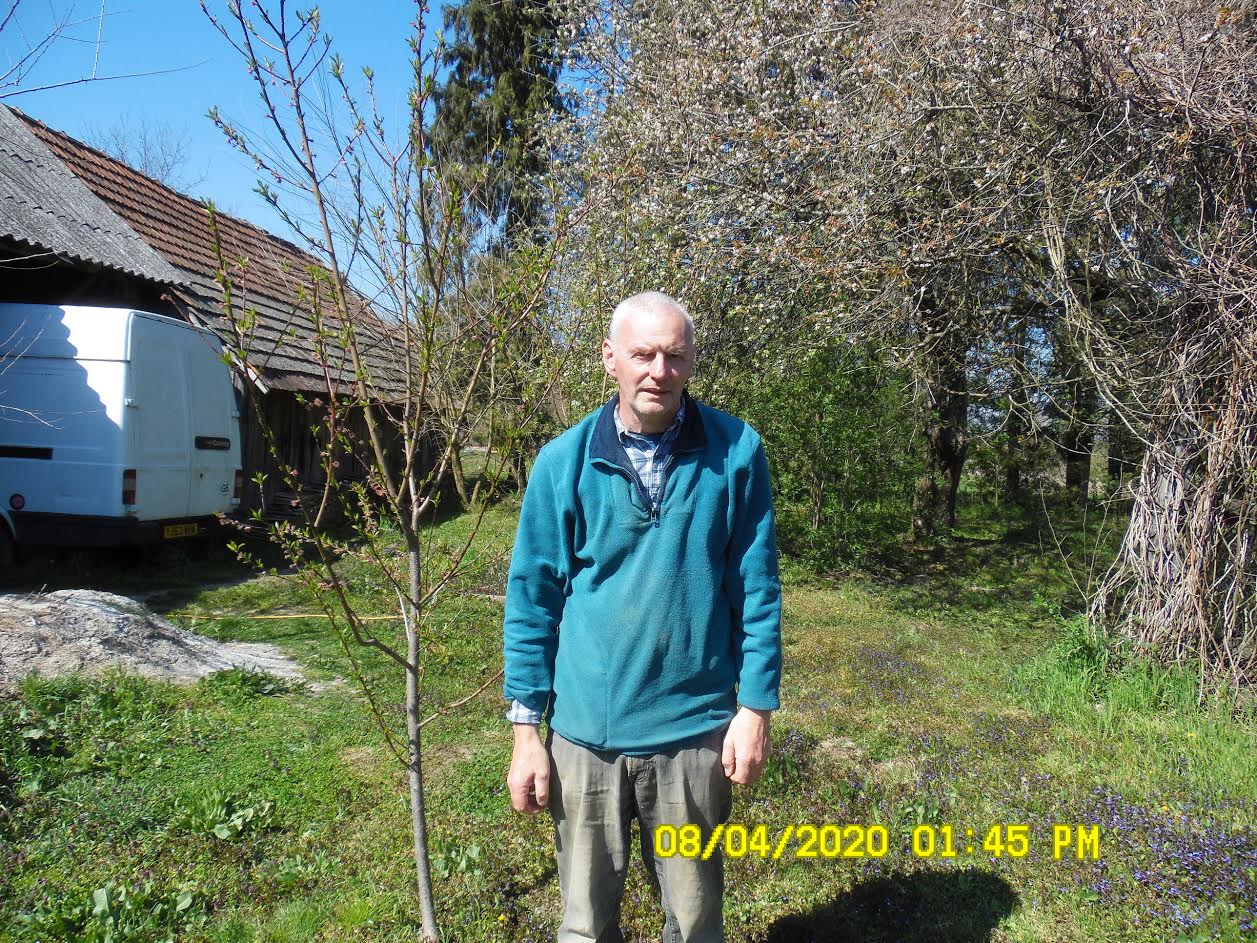
Firstly, how are you? Are you alone/with someone? Tell us a little about your situation and sanity levels.
My health is OK apart from hayfever, something I have suffered for most of my life at this time of year. I am retired and live alone in a small village near Ferdinandovac with my little dog, Dennis. I am doing much the same as normal, mainly gardening and house renovations. So far the only real frustration was that I could not meet with friends to celebrate my 60th birthday.
When did you realise that corona was going to be a big issue?
At first I thought it would be like Ebola and other recent diseases, which were better contained and did not cause widespread disruption. I am in Facebook groups for Croatia and Hungary and have seen the situation unfold through the many threads discussing the virus and measures taken to control the situation.
What is your impression of the way Croatia is dealing with the crisis? How safe do you feel?
Initially I felt that Croatia was taking things too far and it was a case of politicians who want to make names for themselves but my opinion has changed and I now grasp the enormity of the threat. I feel fairly safe from the virus itself but the long term economic and social damage is hard to predict at this stage. My income, like that of many others, could dry up as a result of these economic consequences.
Now compare that to your home country and how they are handling it. What is Croatia doing better/worse?
I am from UK and have a very low opinion of the current UK government. They appear to be doing too little, too late and as a result it seems likely that many thousands of people will die. The health service has been underfunded for years and will simply be overwhelmed by the numbers. The UK has a much higher population density than Croatia anyway, so things like social distancing are more difficult to implement. Most public transport is still running and is one of the main ways people are likely to be too closely grouped together.
What about official communications from the authorities, compared to your home country?
I have been relying on Total Croatia news for English translations of government press releases etc. and they have been doing a fantastic job! My Croatian is very limited but so many people I meet speak English that I have been able to do what they ask in supermarkets etc. Again I have not been impressed by the UK government in terms of being kept informed. A few months ago I registered with the UK government for email updates regarding Brexit and any consequent actions required of UK expats living in EU countries. I thought they would use this email mailing list to send us information about the virus control restrictions but nothing so far!
What's the one thing you wish you had taken with you into self-isolation.
That is a difficult question but I used to live in Hungary and still go there to do shopping sometimes. I can't cross the border now so I wish I had stocked up on a few jars of Lecsó.
One thing you have learned about yourself, and one thing you have learned about others during this crisis.
My income is low and I live quite frugally. This means I don't go out and about very much at the best of times, so the restrictions affect me less than they would many other people. Having said that, it is always good to know that you have freedom, even if you don't do much with it! Having such freedom curtailed is frustrating me more than I would have expected.
Something positive that has come from this crisis is that people are contacting each other more, even if it can only be by email or phone. I have heard from several old friends who would rarely contact me in normal times, I suppose they are usually too busy. Most people seem to be staying calm and getting on with what they have to do. My mother used to tell me about life during World War Two, with bombing, air raid shelters, rationing etc. In some ways that crisis brought out the best in people and I can see something similar now. People are starting to appreciate that having each other is more important than personal wealth, material possessions etc.
Thanks, Philip. Stay safe and see you on the other side.
TCN is starting a new feature series on foreign experiences of sitting out COVID-19 here in Croatia compared to their home country. If you would like to contribute, the questions are below. Please also include a para about yourself and where you are from, and a link to your website if you would like. Please also send 3-4 photos minimum to This email address is being protected from spambots. You need JavaScript enabled to view it. Subject Corona Foreigner
If you would be interested to record a video version for our partners www.rplus.video please let us know in the email. Thanks and stay safe.
Foreigners Self-Isolating in Croatia: Do You Feel Safer Than in Your Home Country?
Firstly, how are you? Are you alone/with someone? Tell us a little about your situation and sanity levels.
What do you think about the economic measures the government is taking, are they helping your business? (PLEASE IGNORE IF THIS DOES NOT AFFECT YOU)
When did you realise that corona was going to be a big issue?
What is your impression of the way Croatia is dealing with the crisis? How safe do you feel?
Now compare that to your home country and how they are handling it. What is Croatia doing better/worse?
What about official communications from the authorities, compared to your home country?
What's the one thing you wish you had taken with you into self-isolation.
One thing you have learned about yourself, and one thing you have learned about others during this crisis.
TCN has recently become a partner in Robert Tomic Zuber's new R+ video channel, initially telling stories about corona experiences. You can see the first TCN contribution from this morning, my video from Jelsa talking about the realities of running a news portal in the corona era below. If you would like to also submit a video interview, please find Robert's guidelines below
VIDEO RECORDING GUIDE
The video footage should be recorded so that the cell phone is turned horizontally (landscape mode).
There are several rules for television and video news:- length is not a virtue- a picture speaks more than a thousand words
In short, this would mean that your story should not last more than 90 seconds and that everything you say in the report should be shown by video (for example, if you talk about empty streets, we should see those empty streets, etc.).
How to do it with your cell phone? First, use a selfie camera to record yourself telling your story for about a minute and a half. Ideally, it would be taken in the exterior, except in situations where you are reporting on things in the interior (quarantine, hospital, self-isolation, etc.). Also, when shooting, move freely, make sure everything is not static.
After you have recorded your report, you should capture footage that will tell your story with a picture, such as an earlier example with empty streets.
One of the basic rules of TV journalism is that the story is told in the same way as a journalist with his text. Therefore, we ask you for additional effort. Because we work in a very specific situation, sometimes you may not be able to capture footage for each sentence of the report. In this case, record the details on the streets: people walking, the main features of the city where you live, inscriptions on the windows related to the virus, etc.
The same rules apply if you are shooting a story from your apartment, self-isolation, quarantine. We also need you to capture footage that describes your story.
When shooting frames to cover your reports, it is important that you change the angle of the shot (in other words, shoot that empty street from several angles). Also, when shooting a detail, count at least five seconds before removing the camera to another detail.
The material should be about 5 minutes long (90 seconds of your report + frames to cover your story).
After recording everything, send us to Zagreb, preferably via WeTransfer to This email address is being protected from spambots. You need JavaScript enabled to view it.
Foreigners Self-Isolating in Croatia: Do You Feel Safer? Johann from Philippines/USA in Zagreb
April 8, 2020 - Do foreigners in Croatia feel more or less safe sitting out COVID-19 here than in their home country, and what are their experiences? A new series on Total Croatia News, with Johann David Go from the Philippines/USA in Zagreb as the 33rd contributor.
Oxford University recently published some research on government responses to coronavirus which showed that Croatia currently has the strictest measures in the world. While inconvenient, this is a good thing in terms of reducing the spread of the virus, and I am certainly not alone in my admiration of the official Croatian handling of this crisis in recent weeks, both in terms of action and communication.
But what do other expats here think? And how does it compare with the response in their home country? Would they rather sit this one out here or there? A new series on TCN, we will be featuring expats from all over the world to see what their views are on life in corona Croatia rather than back home. So far we have heard from expats in Croatia from Romania, USA, Ireland, UK, Mexico, Argentina, Spain, Singapore, Holland, Canada, India, Hong Kong, Venezuela, Latvia, China, Honduras, Hungary, Moldova, South Korea, Japan and Germany. Next up, Johann David Go from the Philippines/USA.
If you would like to contribute to this series, full details are below Johann's interview.
Hi I'm Johann Go from USA/Philippines. I have been living here in Croatia for the past almost 4 years. Many people ask me why I would come here to live and work when the US has so many opportunities. My answer is because I know this is where God has me for now and the summers I get to work at a camp and school years working with young people are far more fulfilling than anything.
Firstly, how are you? Are you alone/with someone? Tell us a little about your situation and sanity levels.
I am actually doing really well. After 3 weeks of being mostly at home, I have finally some sort of rhythm in my life. Not ideal but it works. The best part was I recently got a roommate from the UK and so that has been a blessing to have someone to experience this with. Constantly being at home isn't easy and the constant thoughts of how family is doing in the US and in the Philippines isn't easy, knowing that if something does happen, I may not be able to just hop on a plane and go. Being an extroverted-introvert, quarantine life hasn't been all that hard. I enjoy the more relaxed-not-rushing-into-the-
When did you realize that corona was going to be a big issue?
Right off the bat (pun not intended), when China's numbers were growing. I knew something was not right and with my distrust towards China news... I was kind of not too optimistic about it. When the numbers went up in Italy, we all knew at that time that it was something more serious than just a China problem.
What is your impression of the way Croatia is dealing with the crisis? How safe do you feel?
Funny thing was a good Croatian friend just asked me about this, this morning. The situation is terrible but I am grateful. In the beginning when Italy's numbers went up, I was really frustrated with the Croatian government because of the slow reaction to adding measures to the country. But as time went on, I became more and more satisfied and now to a point of really impressed with how the government of Croatia has handled it. There was a week or so when I was in a crisis mode as well of whether I should stay or go back home. I drove expat friends to the airport and each time, that made me question my decision to stay. I don't judge other people's choices because each one had their reasons and I respected that but I kept asking myself why I am staying. My family lives in the big cities of New York City and Manila in which the virus can spread quickly with how dense it is. We know how New York City is the epicenter of it all and being far from family has been hard. I am writing to you now here in my apartment in Zagreb. I don't feel safe all the time but I know this was the safest place to be to ride out the virus.
Now compare that to your home country and how they are handling it. What is Croatia doing better/worse?
In light of what I am about to say, I would just like to point out that it is easier for us to sit and complain about what we think should/should not happen based on our expectations. It is not easy for governments, health workers, companies, or individuals to make decisions that have long-term impacts in a time like this. So I am grateful for those who step up and make those calls for us and also give grace to them.
Compared to the US and the Philippines, what is Croatia doing right... in my eyes, as I have said, I am very satisfied in terms of measure with what is in place. But considering the economic impact, that I have not much to say other than to help and support one another in a time like this. I heard friends frustrated with the government because of the long-term consequences. It is easy to blame authorities for not looking out for the little ones but my prayer is that the ones in power would be really selfless in a time like this because the nation is really running when the people are functioning well. I believe Croatia has done well thus far and has prepared the health system to have beds, ventilators, etc ready for a spike in cases, quarantine is being enforced as much as they can, and the information flow has been consistent and constant. Svaka cast!
What about official communications from the authorities, compared to your home country?
This is one I believe the US needs work on. Not having a united front as to what the government's stance is on the virus brings distrust and misinformation to the general public. Croatia early on gave power to the crisis management team and that allowed communications to be clear. Whether the government is united or not, it gives the people confidence that the information is coming from one source and that is what we follow! Thank you Bozinovic, Beros, Capak, Markotic, and many others!
What's the one thing you wish you had taken with you into self-isolation?
Home workout equipment.
One thing you have learned about yourself, and one thing you have learned about others during this crisis.
To take things one day at a time. We often worry too much about what the future may hold and what we would like to see ourselves to be in 10 years but I realized that we are not guaranteed more than the present. To entrust it to God and live a life that displays that.
We are all approaching this virus for the first time and many of us have never lived through this big of an epidemic. Because of that, people react to crisis in different ways. We need to extend grace to one another in times like this. To the government, neighbors, employers, employees, friends, families, and to ourselves.
Thanks, Johann. Stay safe and see you on the other side.
TCN is starting a new feature series on foreign experiences of sitting out COVID-19 here in Croatia compared to their home country. If you would like to contribute, the questions are below. Please also include a para about yourself and where you are from, and a link to your website if you would like. Please also send 3-4 photos minimum to This email address is being protected from spambots. You need JavaScript enabled to view it. Subject Corona Foreigner
If you would be interested to record a video version for our partners www.rplus.video please let us know in the email. Thanks and stay safe.
Foreigners Self-Isolating in Croatia: Do You Feel Safer Than in Your Home Country?
Firstly, how are you? Are you alone/with someone? Tell us a little about your situation and sanity levels.
What do you think about the economic measures the government is taking, are they helping your business? (PLEASE IGNORE IF THIS DOES NOT AFFECT YOU)
When did you realise that corona was going to be a big issue?
What is your impression of the way Croatia is dealing with the crisis? How safe do you feel?
Now compare that to your home country and how they are handling it. What is Croatia doing better/worse?
What about official communications from the authorities, compared to your home country?
What's the one thing you wish you had taken with you into self-isolation.
One thing you have learned about yourself, and one thing you have learned about others during this crisis.
TCN has recently become a partner in Robert Tomic Zuber's new R+ video channel, initially telling stories about corona experiences. You can see the first TCN contribution from this morning, my video from Jelsa talking about the realities of running a news portal in the corona era below. If you would like to also submit a video interview, please find Robert's guidelines below
VIDEO RECORDING GUIDE
The video footage should be recorded so that the cell phone is turned horizontally (landscape mode).
There are several rules for television and video news:- length is not a virtue- a picture speaks more than a thousand words
In short, this would mean that your story should not last more than 90 seconds and that everything you say in the report should be shown by video (for example, if you talk about empty streets, we should see those empty streets, etc.).
How to do it with your cell phone? First, use a selfie camera to record yourself telling your story for about a minute and a half. Ideally, it would be taken in the exterior, except in situations where you are reporting on things in the interior (quarantine, hospital, self-isolation, etc.). Also, when shooting, move freely, make sure everything is not static.
After you have recorded your report, you should capture footage that will tell your story with a picture, such as an earlier example with empty streets.
One of the basic rules of TV journalism is that the story is told in the same way as a journalist with his text. Therefore, we ask you for additional effort. Because we work in a very specific situation, sometimes you may not be able to capture footage for each sentence of the report. In this case, record the details on the streets: people walking, the main features of the city where you live, inscriptions on the windows related to the virus, etc.
The same rules apply if you are shooting a story from your apartment, self-isolation, quarantine. We also need you to capture footage that describes your story.
When shooting frames to cover your reports, it is important that you change the angle of the shot (in other words, shoot that empty street from several angles). Also, when shooting a detail, count at least five seconds before removing the camera to another detail.
The material should be about 5 minutes long (90 seconds of your report + frames to cover your story).
After recording everything, send us to Zagreb, preferably via WeTransfer to This email address is being protected from spambots. You need JavaScript enabled to view it.
Foreigners Self-Isolating in Croatia: Do You Feel Safer? Sara from Texas in Split
April 8, 2020 - Do foreigners in Croatia feel more or less safe sitting out COVID-19 here than in their home country, and what are their experiences? A new series on Total Croatia News, with Sara Dyson from Texas but currently holed up in Split, as the 32nd contributor.
Oxford University recently published some research on government responses to coronavirus which showed that Croatia currently has the strictest measures in the world. While inconvenient, this is a good thing in terms of reducing the spread of the virus, and I am certainly not alone in my admiration of the official Croatian handling of this crisis in recent weeks, both in terms of action and communication.
But what do other expats here think? And how does it compare with the response in their home country? Would they rather sit this one out here or there? A new series on TCN, we will be featuring expats from all over the world to see what their views are on life in corona Croatia rather than back home. So far we have heard from expats in Croatia from Romania, USA, Ireland, UK, Mexico, Argentina, Spain, Singapore, Holland, Canada, India, Hong Kong, Venezuela, Latvia, China, Honduras, Hungary, Moldova, South Korea, Japan and Germany. Next up, Sara Dyson from Texas in Split.
If you would like to contribute to this series, full details are below Sara's interview.
Hey, I’m Sara from Texas. I’m currently (and usually) working from home in Split. This has been my home since 2012. I like margaritas and getting caught in the sun.
I do a few things:
- Advise people on how to move to Croatia, particularly as it relates to immigration, citizenship and healthcare
- Build websites for small businesses
- Operate a Game of Thrones Tour (currently very quiet)
You can reach me on Facebook or on my site expatincroatia.com
Firstly, how are you? Are you alone/with someone? Tell us a little about your situation and sanity levels.
It’s touch and go, every day is different. Some days I feel like I’ve accepted this new reality and am excited about using this time productively, and on others days I find myself still stuck in the 5 stages of grief.
Some days I look forward to the innovation and new ideas that will birth from this strangely quiet, distraction-free environment. Other days, I hope if I click my heels three times, I’ll return to Kansas. Not Kansas, Kansas, but the world before the virus tornado carried us away. I keep toggling between denial and acceptance, with a dash of anger and bargaining sprinkled in.
I usually work from home and have been called a hermit on a number of occasions, so this “should” be the same old, same old for me. It isn’t. I miss hugs and human contact and having sunny coffees and conversations without the risk of someone’s face freezing.
The biggest impact on my sanity has been the lack of pazar. Usually, I’m shopping every couple days on the pazar near my house, chatting with my favorite vendors and ending it with a coffee at my local spot. The supermarket is not a substitute as their produce is often rotten. I really miss fresh produce, but I’m starting to see farms setting up delivery options. Just today, I noticed a new produce stand pop up in a retail space that has been vacant for 2+ years. Truly excited to see how local farms adapt to this pazar-less era.
I am keeping pretty busy these days. Between writing for ‘Expat in Croatia’ and building websites, I’m neck-deep Monday through Friday. My only free time is on the weekends, which is when I go full analogue. With the phone on airplane mode, I work on a garden in my lođa with the help of a robot from Latvia. It’s not really a robot, but it does help cancel out my tendency to kill plants. I’ve got cherry tomatoes, cucumbers (hopefully), dill, oregano, green leaf lettuce, basil, jalapenos, cilantro and even rhubarb. Radishes are my next hurdle.
I’m also doing a lot of magazine reading, like in the good ol’ days. I bought a lifetime subscription to Rolling Stone magazine when I was 16-years-old. Whenever I’m in the States, I pick up 2 years-worth at the PO box, bring them over the ocean where they proceed to collect dust. Now, there is finally time to catch up on what Radiohead was doing in 2017.
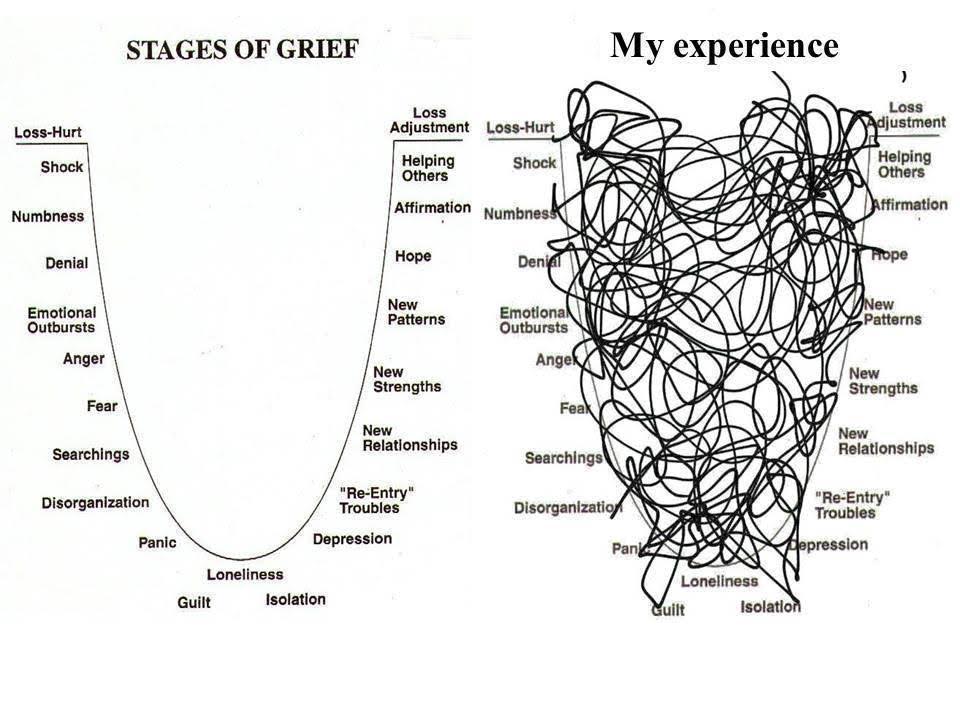
What do you think about the economic measures the government is taking, are they helping your business?
I think the government is doing a decent job of implementing of a variety of economic and tax relief measures quickly. It is proof that government can function and be effective.
The measures don’t apply to me, but I have seen them help businesses owned by friends and partners, which is good.
However, it’s not all about the measures. They are going to help in the short term, but Croatia has a long-term economic disaster on its hands. For too long, Croatia has viewed tourism as its golden goose with a solitary mission of bleeding tourists dry. That short-term vision of gimme, gimme, gimme and unnecessarily high taxes are why things are so critical now.
A country cannot sustain on one industry alone. The biggest problem with tourism in Croatia is that it unnaturally increases the cost of living for Croatians, while not serving the Croatian community at all. The most successful businesses are the ones that operate year-round and are supported by locals as well as tourists.
I hope that the pandemic inspires change within the government and among residents to create new opportunities, technologies and businesses that serve Croatians and that can be exported to other parts of the world.
When did you realize that corona was going to be a big issue?
On March 9, I heard from a reader who thought we should do a post called “Should I cancel my trip to Croatia due to coronavirus?”. At the time, there were only 12 cases and the government seemed to be doing a decent job of delaying the impact here so it seemed reasonable. Croatia had barely been touched.
Within 3 days, things had changed dramatically so I took the post down and washed my hands of it (see what I did there). Just a month later, we are in a new world.
What is your impression of the way Croatia is dealing with the crisis? How safe do you feel?
I am impressed with how the government is handling this crisis. In particular, I’m glad they launched koronavirus.hr, which has all the latest information and everything we could possibly need to know about it.
As far as the people, there are still too many still not staying at home. I’m not referring to those going to work or those that have a purpose for being outside or those just taking a walk or those that need space from an abusive family. I’m talking about the clusters of twenty-something Splićani acting like it’s just a snow day. For the safety of your parents and your baba, please go inside, or at least fan out. Dva metara!
Now compare that to your home country and how they are handling it. What is Croatia doing better/worse?
It is night and day. My motherland America is FUBAR. The US government is led by the most unqualified person to ever be in office (I say that fully aware that there is currently a town in Texas with a goat as a mayor).
While most countries in the world including Croatia have one centralized government leading them through this crisis, America does not. The US has a decentralized government, which gives significant power to the 50 states. The president “could” make a national policy of how to combat the pandemic, but he chooses not to. The president is only concerned about his poll numbers and blaming Obama, so he’s leaving it up to the individual states to decide what to do about the virus.
The 50 states are all doing different things, because they all have different beliefs on the basic facts about the virus and how to handle prevention, spread and treatment. Last week, the governor of Georgia said he just found out that people can transmit the virus without having symptoms. FACE PALM.
People can drive or fly into other cities, counties and states whenever they want. Without one cohesive direction for the entire country, the US will continue to rack up infections and deaths. America now has more cases of any country in the world with a significant lead, nearly 5X what China has alone. We’re #1! We’re #1!
It’s concerning. My entire family and many of my friends live in the US. Some live in states taking it seriously (California, New York) and others live in states that are still debating basic facts (Texas, Florida). I feel safe here, but they are definitely not safe there and there is not a single thing I can do about it. Many aren’t even taking it that seriously because they don’t know they need to. Why would they when their governments aren’t treating it like a big deal?
So yes, Croatia is a doing a much better job. There is one national policy that applies to everyone and it is paying off. Non-essential businesses are closed, people can’t gather in groups of more than 5, we are constantly reminded to keep a distance of 2 meters, and there is no intercity travel. These are all things the US is not actively doing at the national level.
What about official communications from the authorities, compared to your home country?
The Croatian president makes clear, focused statements about what the government is doing to protect the nation. Updates are made to koronavirus.hr multiple times a day.
The US president dementia rambles until he grows tired of yelling at reporters. The web site the US government launched is pathetic in comparison to Croatia’s. The site barely has any content and most links just go to the CDC (Center for Disease Control) web site. The CDC, a national agency, only just started recommending people wear masks at the end of last week.
What's the one thing you wish you had taken with you into self-isolation.
Freshly sharpened knives.
One thing you have learned about yourself, and one thing you have learned about others during this crisis.
WHAT I’VE LEARNED
At this moment, I feel very lucky that my income is diversified. On more than many occasions in the past year, I’ve actively sought to consolidate and only have one job instead of three. Right now, I am super grateful that I didn’t consolidate. This job variety is keeping the lights on, considering my tour business just issues refunds these days. These weird circumstances changed the perception of spreading myself a bit thin from being a negative into a silver lining.
WHAT I’VE LEARNED ABOUT OTHERS
People are extremely capable of adapting to new circumstances, even when those circumstances are unimaginable. Because the whole world has been affected by the pandemic, it can be easy to think it is the only thing happening and that life has stopped, but that is not true, not for everybody at least.
Real life has continued. People are still working. Babies are being born. New ideas are being thought up. People are passing away for reasons that have absolutely nothing to do with coronavirus. Recently, the mother of a client of mine passed away due to natural causes. Because of the pandemic, most of the family couldn’t come to the funeral so they Facetime-d it out to relatives across the country. They adapted. We are all adapting in our own way.
Thanks, Sara. Stay safe and see you on the other side.
TCN is starting a new feature series on foreign experiences of sitting out COVID-19 here in Croatia compared to their home country. If you would like to contribute, the questions are below. Please also include a para about yourself and where you are from, and a link to your website if you would like. Please also send 3-4 photos minimum to This email address is being protected from spambots. You need JavaScript enabled to view it. Subject Corona Foreigner
If you would be interested to record a video version for our partners www.rplus.video please let us know in the email. Thanks and stay safe.
Foreigners Self-Isolating in Croatia: Do You Feel Safer Than in Your Home Country?
Firstly, how are you? Are you alone/with someone? Tell us a little about your situation and sanity levels.
What do you think about the economic measures the government is taking, are they helping your business? (PLEASE IGNORE IF THIS DOES NOT AFFECT YOU)
When did you realise that corona was going to be a big issue?
What is your impression of the way Croatia is dealing with the crisis? How safe do you feel?
Now compare that to your home country and how they are handling it. What is Croatia doing better/worse?
What about official communications from the authorities, compared to your home country?
What's the one thing you wish you had taken with you into self-isolation.
One thing you have learned about yourself, and one thing you have learned about others during this crisis.
TCN has recently become a partner in Robert Tomic Zuber's new R+ video channel, initially telling stories about corona experiences. You can see the first TCN contribution from this morning, my video from Jelsa talking about the realities of running a news portal in the corona era below. If you would like to also submit a video interview, please find Robert's guidelines below
VIDEO RECORDING GUIDE
The video footage should be recorded so that the cell phone is turned horizontally (landscape mode).
There are several rules for television and video news:- length is not a virtue- a picture speaks more than a thousand words
In short, this would mean that your story should not last more than 90 seconds and that everything you say in the report should be shown by video (for example, if you talk about empty streets, we should see those empty streets, etc.).
How to do it with your cell phone? First, use a selfie camera to record yourself telling your story for about a minute and a half. Ideally, it would be taken in the exterior, except in situations where you are reporting on things in the interior (quarantine, hospital, self-isolation, etc.). Also, when shooting, move freely, make sure everything is not static.
After you have recorded your report, you should capture footage that will tell your story with a picture, such as an earlier example with empty streets.
One of the basic rules of TV journalism is that the story is told in the same way as a journalist with his text. Therefore, we ask you for additional effort. Because we work in a very specific situation, sometimes you may not be able to capture footage for each sentence of the report. In this case, record the details on the streets: people walking, the main features of the city where you live, inscriptions on the windows related to the virus, etc.
The same rules apply if you are shooting a story from your apartment, self-isolation, quarantine. We also need you to capture footage that describes your story.
When shooting frames to cover your reports, it is important that you change the angle of the shot (in other words, shoot that empty street from several angles). Also, when shooting a detail, count at least five seconds before removing the camera to another detail.
The material should be about 5 minutes long (90 seconds of your report + frames to cover your story).
After recording everything, send us to Zagreb, preferably via WeTransfer to This email address is being protected from spambots. You need JavaScript enabled to view it.
Foreigners Self-Isolating in Croatia: Do You Feel Safer? Paul from UK in Jelsa, Hvar
April 8, 2020 - Do foreigners in Croatia feel more or less safe sitting out COVID-19 here than in their home country, and what are their experiences? A new series on Total Croatia News, with TCN boss Paul Bradbury, originally from the UK and now in Jelsa on Hvar, as the 31st contributor.
Oxford University recently published some research on government responses to coronavirus which showed that Croatia currently has the strictest measures in the world. While inconvenient, this is a good thing in terms of reducing the spread of the virus, and I am certainly not alone in my admiration of the official Croatian handling of this crisis in recent weeks, both in terms of action and communication.
But what do other expats here think? And how does it compare with the response in their home country? Would they rather sit this one out here or there? A new series on TCN, we will be featuring expats from all over the world to see what their views are on life in corona Croatia rather than back home. So far we have heard from expats in Croatia from Romania, USA, Ireland, UK, Mexico, Argentina, Spain, Singapore, Holland, Canada, India, Hong Kong, Venezuela, Latvia, China, Honduras, Hungary, Moldova, South Korea, Japan and Germany. Next up, me. Several people contacted me, asking if I would write my experienes from Jelsa on Hvar, so here it is.
If you would like to contribute to this series, full details are below.
Firstly, how are you? Are you alone/with someone? Tell us a little about your situation and sanity levels.
Well I can't say life is dull.
We are doing really, really well, and I am so proud of and grateful to my amazing three girls.
When school closed down for a fortnight recently, we had a big decision to make. Did we stay in our house in a village in Varazdin, or head back to Jelsa on Hvar, where our previous home turned holiday home, turned cancelled bookings was a much better option. Dalmatian sun, the terrace, the Adriatic.
Of course, if we were to go to the island, we would have to employ strict self-isolation. The reality was that this was going to take longer than 2 weeks for sure, perhaps two months, perhaps longer. To be cooped up in the house in the village near Varazdin, or to at least be able to enjoy the sun, the terrace and the view of the Adriatic.
We held a family summit, and we all agreed - let's go to Hvar.
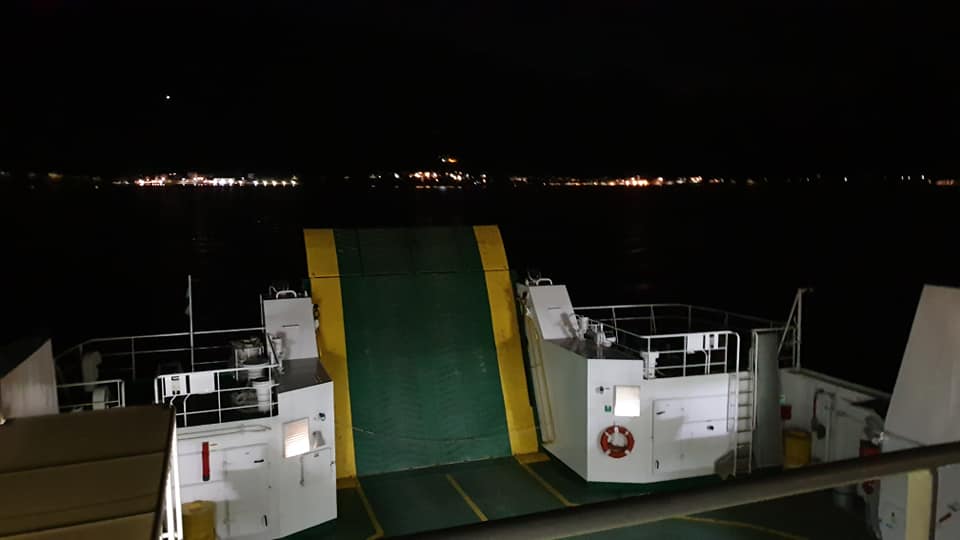
(The evening ferry to Sucuraj and last glimpse of the mainland. Who knows when we will see it next?)
And from that moment, family unity has been magnificent, and I am so proud of all three of them. Mum managed somehow to pack everything up and squeeze it into the car, not knowing how long we would be gone. We have everything we need. We drove to Drvenik to try and make the ferry to Sucuraj, and with Taliah's GPS updates, we made it with 7 minutes to spare.
And since then, I have not met anyone outside the family, chained to my laptop on the couch for 16 hours a day on average, with 30 priceless minutes by the sea to rescue my sanity.
The girls have been magnificent, and it can't be easy for them, especially now that online schooling in Croatia is the new norm - a totally new concept (and you can see their impressions of online schooling in the video interview they did, above).
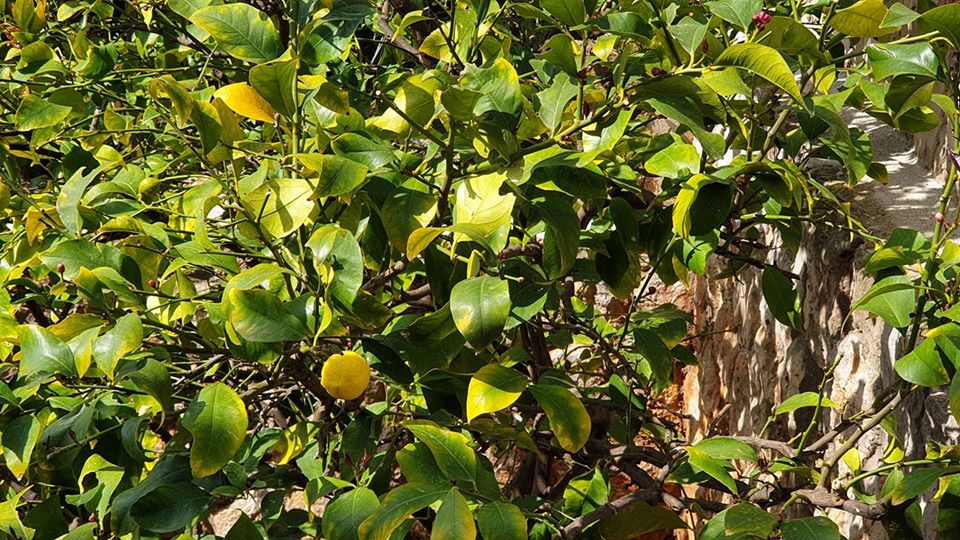
(No gin and tonic but plenty of lemons)
There are seven of us in our self-isolation unit. My wife and kids are with me in our apartment, and my sister, mother and father-in-law below. The three ladies are doing incredible things in the kitchen, and my punac is bringing amazing produce from the field where he works all day. This has brought us much closer as a family, and morale is high. No attempted murders to report - yet.
Professionally, it has been a tsunami of events, emotions and experiences (as it has been for everyone, so there is nothing exceptional about my story). I lost every cilent I had, 100% of them, in three days, and Adsense and the family field is keeping us alive at the moment. But I think that particular curve has flattened, as yesterday, we got our first new client! I lost a lot in 2008, but as I have almost nothing to lose this time, this will not affect me as much as others. And I look at other, dear friends who have worked much harder than me and built up fabulous businesses, with textbook planning and execution. But the corona effect didn't make it into the textbooks of business planning.
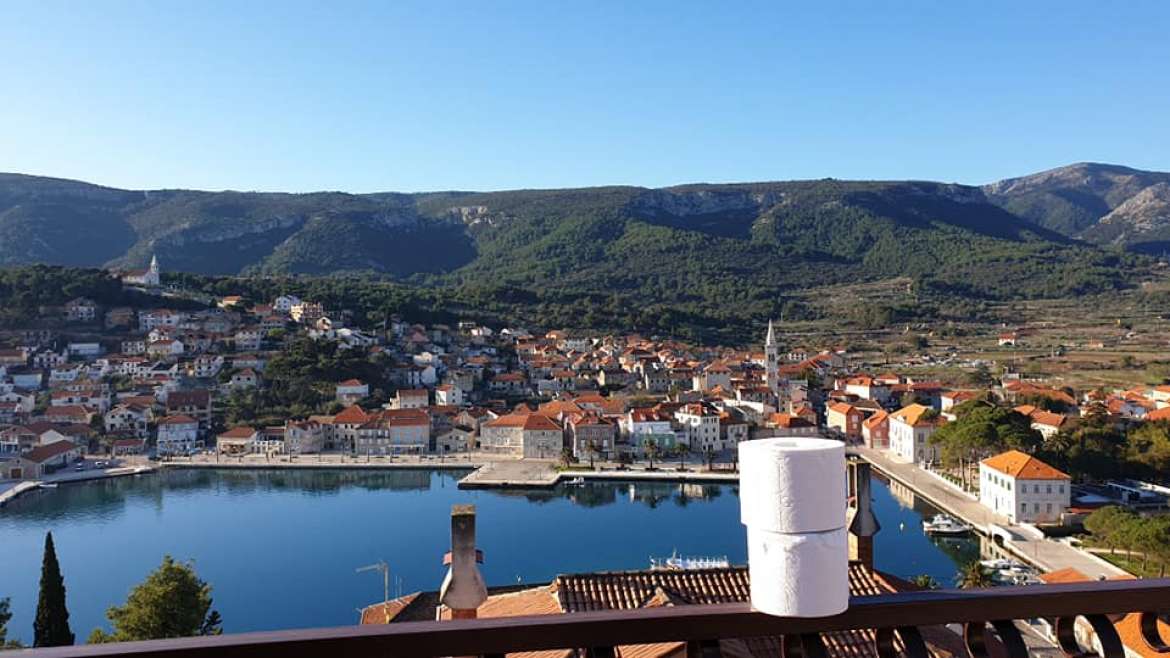
Mentally, I am very strong and focused, and I need to be. The fantastic support network of the girls, the Dalmatian sun streaming through the windows, and that precious 30 minutes by the Adriatic each evening are all essential, as are three online stress relievers. The irreverent messenger chat with my two fave TCN ladies, Dani and Lauren, is where we all let off steam, the chat between Lauren, myself and the Jurgen Klopp of science, Igor Rudan, fills me with joy and my belly with laughter. Igor truly is the funniest man I have never met.
And then there is the Facebook wall of Marko Rakar, whose combination of hilarious memes and brutal truths about what is coming make for addictive viewing, and I check in twice a day.
And I certainly need that support network to keep our three news portals together in Croatia, Montenegro and Slovenia. In addition to the crap we are all going through, I have one writer who had suspected corona and got tested (thankfully negative), another whose elderly mother has just caught it, , having to reduce staff due to no income, threats from the authorities forcing me to unpublish an article they didn't like (which subsequently appeared on other Croatian portals 2 days later - and are still live) with the promise of fines, trying to keep tabs on the mental health and stress of my writers who are being unbelievable in their dedication and application, a writer resigning a few days after the earthquake. And dealing with the abuse and inflamed emotions of our readers at a time like this, where the loose use of a word (which happens when you are chained to your laptop from 05:00 until 22:00 apart from lunch and that 30 mins by the sea) is taken as a personal attack by someone.
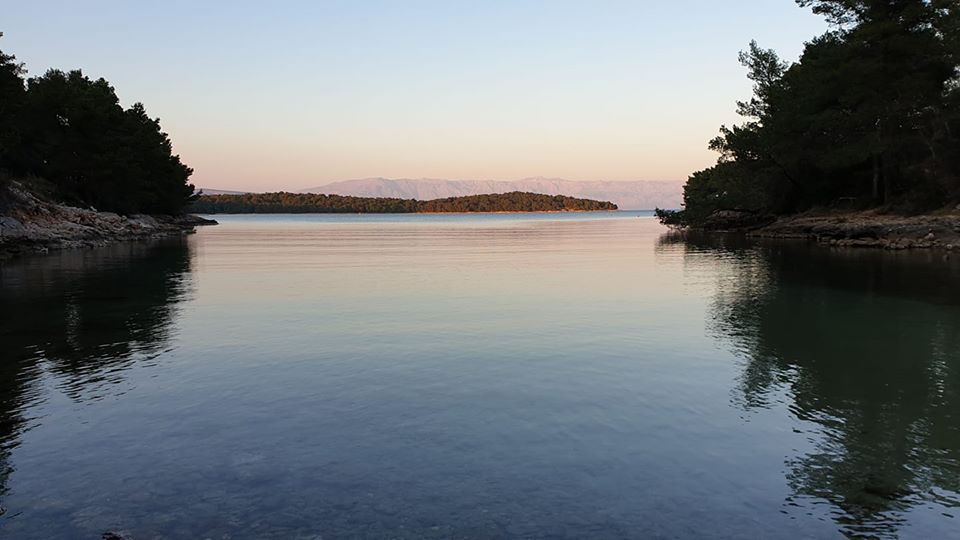
(One of the pillars which keeps me sane - 30 mins a day)
I am used to being responsible for everything in Croatia, from Bleiburg to Hajduk not winning the Champions League, but this is a VERY challenging time to be a writer, and I have to think about every word I publish (which has never been my style). Add to that the fact that corona has changed language. I posted a story about a 'super positive Moldovan wedding planner under quarantine on Murter.' The only association with the word positive these days is not a happy one, someone pointed out. You can read more in Realities of Running an English News Portal in the Corona Era.
But overall, I am doing great, and I am focused on trying to give the many, many people depending on TCN the very best and most accurate news, which is only possible due to my two amazing teams - at home and my TCN colleagues.
Oh, and I am growing a beard for the first time in 25 years.
It looks terrible.
What do you think about the economic measures the government is taking, are they helping your business?
Unlike the last question, I don't have much to say on this one, as I have not had time to look into it in detail. I will qualify for 3250 kuna a month for the next two months I understand, but my friends from Glas Poduzetnika (Voice of Entrepreneurs) made their feelings known by demanding the resignation of the Minister of Economy, as well as highlighting the fact that an alarming statistic that 93% of private businesses in their group will go bust within 3 months without significant help. And how does the Mighty State of Uhljebistan respond? The chart below is private-sector job losses since the start of the crisis (source Index.hr last Friday) on the left, public sector job losses on the right. It is why I believe that North Korea and Uhljebistan and the only true corona-proof states in the world (and yes, this is an attempt at humour to prove a point - have to be careful with my words).
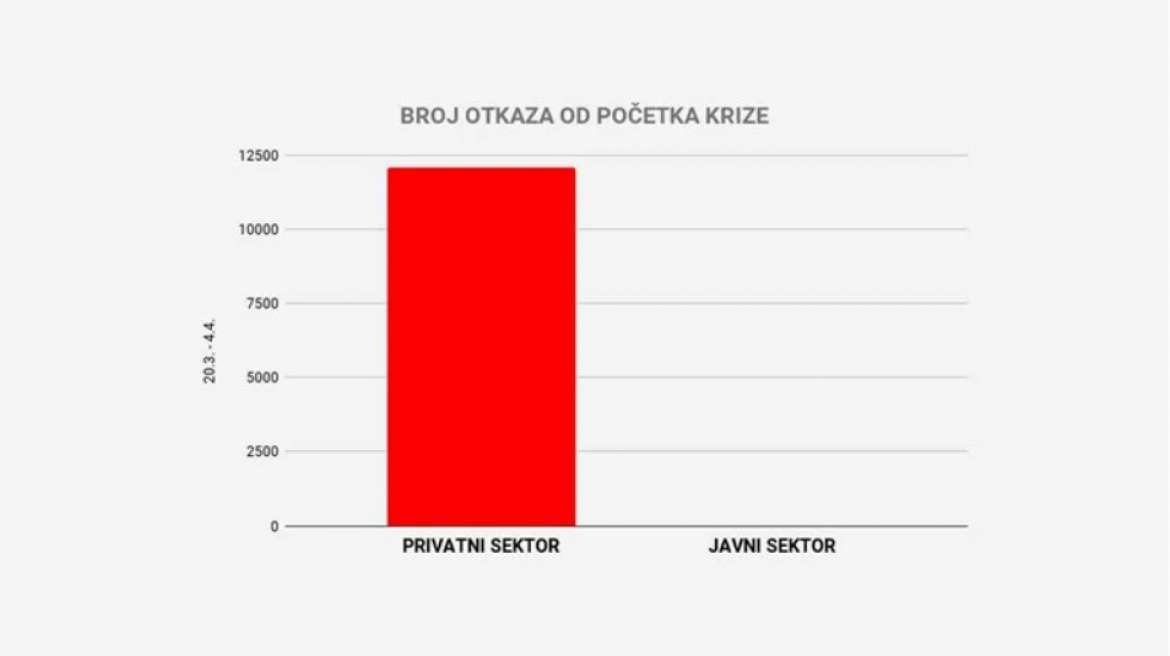
When did you realise that corona was going to be a big issue?
I started following the story in mid-January, and I asked Iva to do a piece on January 25, 2020, our first coverage, What is Croatia Doing to Prevent the Spreading of the New Coronavirus? This was three days before King Vili became Health Minister. Interesting reading, isn't it? Forrest started his excellent daily updates the next day, and we were fully informed.
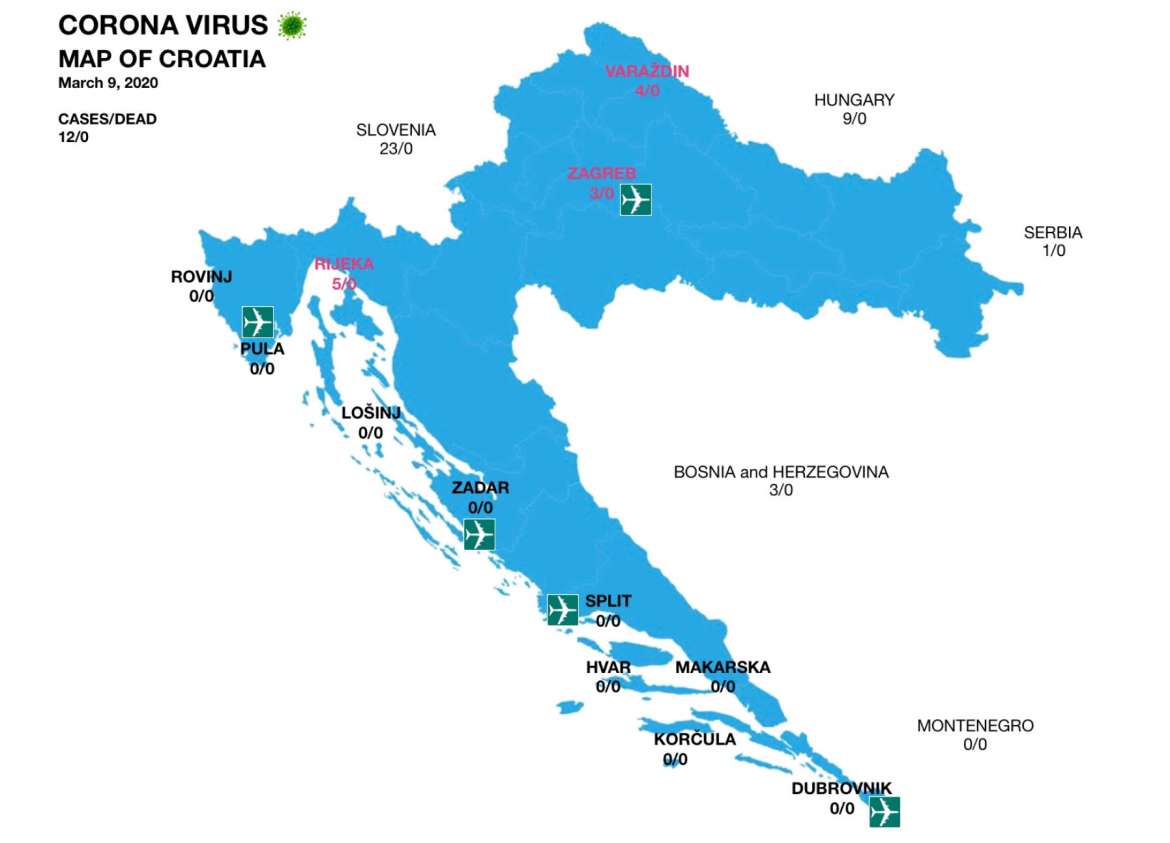
Like many, I misjudged the seriousness of corona. We came out with the first ever corona map of Croatia on March 9 (thanks to my amazing wife). Back then, there were just a few cases in Rijeka, Varazdin and Zagreb. I was aware of the panic and anxiety that was out there about flights and tourism. And so I thought it would be helpful to the tourism industry to show the situation with the airports, as well as the surrounding countries, which all had very few cases and no deaths. The readership was huge on this article, second only to the Zagreb earthquake breaking news I published 15 mins after it struck. The big discussion was whether or not to include the horror show of Italy in the map. As the aim of the map was to clarify and reassure, I decided to keep Italy off the map. In hindsight, that was probably a bad call.
On March 22, I posted this on Facebook, which explains my timeline. This is the article mentioned - From Shanghai to Seoul to Zagreb: Why I Felt Safer in China.
What is your impression of the way Croatia is dealing with the crisis? How safe do you feel?
I feel that I am in the safest place in Europe right now, in terms of the health threat (not so sure about the economic apocalypse which is coming). Who would have thought that the Croatian government could pull this off so superbly? And in our fascinating series interviewing expats from all over the world on how they are coping in Croatia (30 submissions so far), I don't think there is one who feels less safe in Croatia than they would be back home. You can see the series here.
I will be contributing to the fund to build statues of Vili and Alemka on Ban Jelacic Square when all this is over. But I also think it is important not to forget just how lucky Croatia was to have such a corrupt previous Minister of Health (let's add the word alleged here, in these sensitive times), and there should be a third statue for the investigative journalists whose stories on the erstwhile minister's property portfolio led to his replacement by King Vili. It should not be forgotten that while the former minister was holding press conferences in which he told us he was paying his lawyer 500 kuna an hour to help explain he had done nothing wrong, a bus full of Chinese tourists, including 18 from Wuhan, had arrived from Milan and was taking in the sights of Plitvice Lakes, Zadar and Dubrovnik.
Now compare that to your home country and how they are handling it. What is Croatia doing better/worse?
Yeah. Next question.
(TCN media HQ)
What about official communications from the authorities, compared to your home country?
I have been an aid worker in many hot spots in my career, including arriving 2 weeks after the 1994 genocide in Rwanda. I have never - ever - seen a crisis management and communications performance that comes close to what the National Civil Protection Headquarters is putting out. It is beyond impressive. And I would add to that the outstanding contributions from scientist Igor Rudan, whose texts are among the best on the Internet on corona. I have to pinch myself sometimes that I am in a fun chat with him and Lauren, as he is advising the Prime Minister and Health Minister on how to keep Croatia safe. And then to see that not only is Lauren now his official translator, but Igor insists the English version of his texts appear on TCN first. Thank you Sir - for everything! You can read Igor's texts here.
If the government could apply this transparency and open communication to its other ministries in the post-corona era, what a country Croatia could be.
What's the one thing you wish you had taken with you into self-isolation?
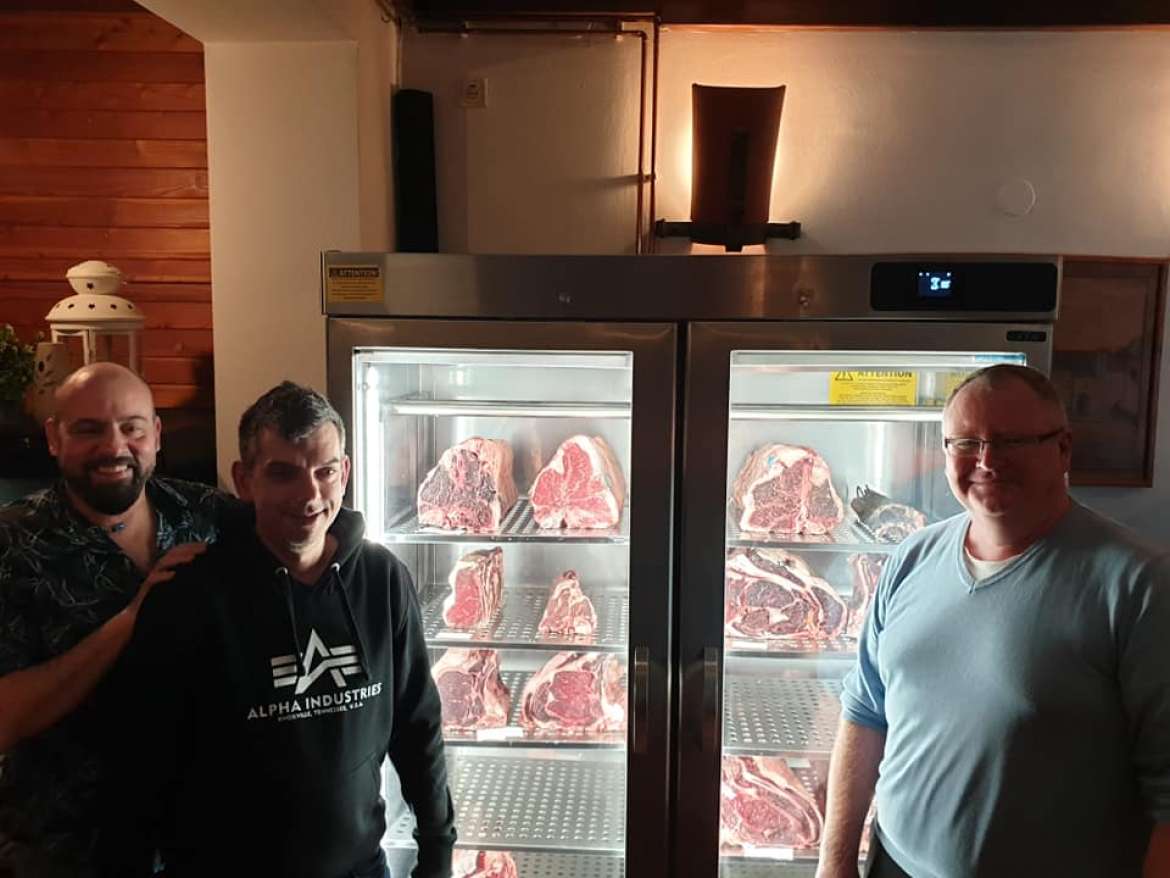
The fridge at one of my favourite restaurants in Croatia - Durina Hiza in Varazdinske Toplice. Thankfully, owner Nikola Bozic is bringing the fridge to us with this outstanding steak delivery service. He is coming to Split on April 17, so I need to figure out a way to get my order to Jelsa from there. Check out the new delivery service here - it will grow and add more quality local producers. I hope it becomes the future of how we food shop in Croatia.
I was missing my blogging bathrobe, until I mentioned that this to my wife. She then opened a drawer and produced it. Quite how she managed to put EVERYTHING we needed into the car at very short notice, I will never know. Amazing woman - thank you, wife.
One thing you have learned about yourself, and one thing you have learned about others during this crisis.
That I am not very good at growing a beard.
About others, I have learned a LOT, but perhaps best not to elaborate here. I already have a special talent for inflaming emotions. Suffice to say that I have a clear idea of who I do - and who I don't - want to hang out with on the other side. And some of the don'ts have really surprised me.
I suppose the most important thing I have learned is that when you have two foundation rocks such as my amazing family and my amazing TCN team, everything else is easy to deal with. Thank you both.
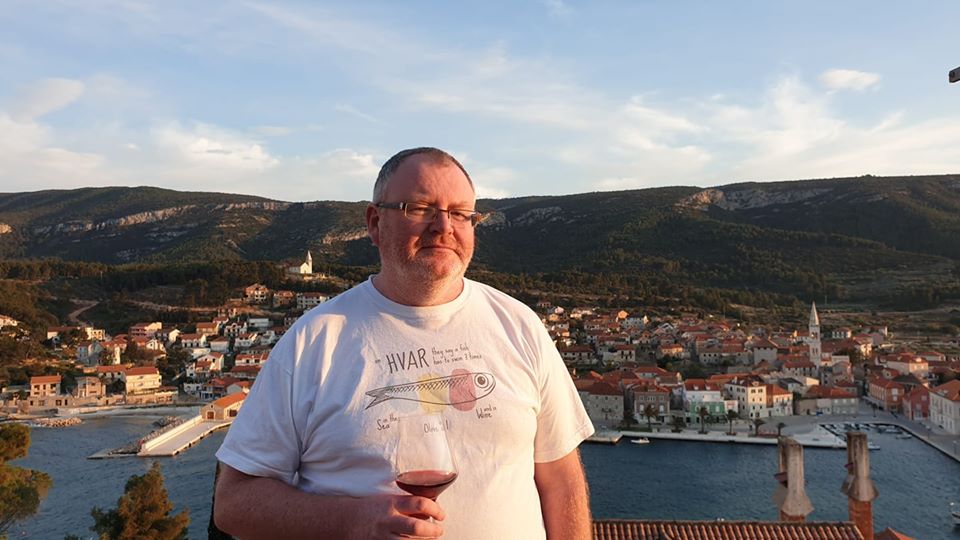
TCN is starting a new feature series on foreign experiences of sitting out COVID-19 here in Croatia compared to their home country. If you would like to contribute, the questions are below. Please also include a para about yourself and where you are from, and a link to your website if you would like. Please also send 3-4 photos minimum to This email address is being protected from spambots. You need JavaScript enabled to view it. Subject Corona Foreigner
If you would be interested to record a video version for our partners www.rplus.video please let us know in the email. Thanks and stay safe.
Foreigners Self-Isolating in Croatia: Do You Feel Safer Than in Your Home Country?
Firstly, how are you? Are you alone/with someone? Tell us a little about your situation and sanity levels.
What do you think about the economic measures the government is taking, are they helping your business? (PLEASE IGNORE IF THIS DOES NOT AFFECT YOU)
When did you realise that corona was going to be a big issue?
What is your impression of the way Croatia is dealing with the crisis? How safe do you feel?
Now compare that to your home country and how they are handling it. What is Croatia doing better/worse?
What about official communications from the authorities, compared to your home country?
What's the one thing you wish you had taken with you into self-isolation.
One thing you have learned about yourself, and one thing you have learned about others during this crisis.
TCN has recently become a partner in Robert Tomic Zuber's new R+ video channel, initially telling stories about corona experiences. You can see the first TCN contribution from this morning, my video from Jelsa talking about the realities of running a news portal in the corona era below. If you would like to also submit a video interview, please find Robert's guidelines below
VIDEO RECORDING GUIDE
The video footage should be recorded so that the cell phone is turned horizontally (landscape mode).
There are several rules for television and video news:- length is not a virtue- a picture speaks more than a thousand words
In short, this would mean that your story should not last more than 90 seconds and that everything you say in the report should be shown by video (for example, if you talk about empty streets, we should see those empty streets, etc.).
How to do it with your cell phone? First, use a selfie camera to record yourself telling your story for about a minute and a half. Ideally, it would be taken in the exterior, except in situations where you are reporting on things in the interior (quarantine, hospital, self-isolation, etc.). Also, when shooting, move freely, make sure everything is not static.
After you have recorded your report, you should capture footage that will tell your story with a picture, such as an earlier example with empty streets.
One of the basic rules of TV journalism is that the story is told in the same way as a journalist with his text. Therefore, we ask you for additional effort. Because we work in a very specific situation, sometimes you may not be able to capture footage for each sentence of the report. In this case, record the details on the streets: people walking, the main features of the city where you live, inscriptions on the windows related to the virus, etc.
The same rules apply if you are shooting a story from your apartment, self-isolation, quarantine. We also need you to capture footage that describes your story.
When shooting frames to cover your reports, it is important that you change the angle of the shot (in other words, shoot that empty street from several angles). Also, when shooting a detail, count at least five seconds before removing the camera to another detail.
The material should be about 5 minutes long (90 seconds of your report + frames to cover your story).
After recording everything, send us to Zagreb, preferably via WeTransfer to This email address is being protected from spambots. You need JavaScript enabled to view it.
Corona Voices in the Croatian Diaspora: Alida from Hvar in Florida
April 7, 2020 - With as many Croatians living abroad as in the Homeland, what are the diaspora experiences of self-isolation? In the fifth of a new series, Corona Voices in the Croatian Diaspora, here is Alida Paljevic in Florida and originally from Jelsa on Hvar.
Last week TCN started a feature series called Foreigner Self-Isolation In Croatia: Do You Feel Safer? I can honestly say we have never had such a response or so many incredible contributions. The countries of origin of these expats in Croatia literally from all over the world. So far we have had submissions from expats from Romania, USA, Ireland, UK, Mexico, Argentina, Spain, Singapore, Holland, Canada, India, Hong Kong, Venezuela, Latvia, China, Honduras, Hungary, Moldova, New Zealand, Japan and Germany. You can see all their stories here.
Given the success of the series (still going strong) and large interest, it made sense to expand it to look at this from another angle - how Croatians abroad are coping where they are. If you would like to contribute your story to Corona Voices in the Croatian Diaspora, please find the submission guidelines below. And now, the view from Florida through the eyes of Alida Paljevic, who went to school with my wife in Jelsa all those years ago.
My name is Alida Paljevic, and my family of 3 lives in Florida, in a town called Dania Beach right between Miami and Fort Lauderdale.
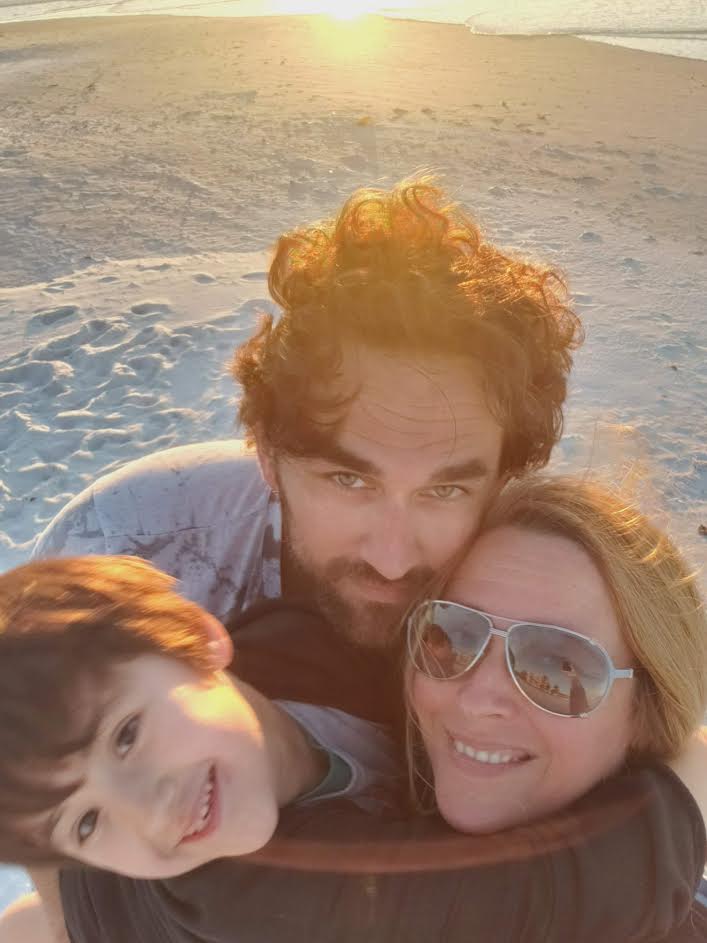
Originally, I am from the most beautiful island in Europe, the island of Hvar, but for 20 years I lived in Zagreb, before moving to the US 4 years ago for an amazing job offer.
I work in the travel industry that has been hit very hard by this Coronavirus crisis, it was the first to take the hit and it will be the last to recover. But it will recover! And Americans will travel to Croatia and Europe again.
If we put aside the current situation, my career in the travel industry was really fulfilling and exciting. I truly love what I do and I can’t wait for this all to pass so that I can continue to send travelers from North America to Croatia and Europe.
Firstly, how are you? Are you alone/with someone? Tell us a little about your situation and sanity levels.
We are OK, we are a bit bored to be at home all the time, and we have been at home for the past 4 weeks with the exception of a few trips to the store for food. Lately, we stopped even going out for food and we are using grocery delivery services instead. I work from home, my son is going to school online and doing some work through 2 school apps, one for math and one for English. It is stressful a bit… My husband works as a private fitness trainer and of course his gym is closed too now. Luckily, we live in a townhouse that has a bit of a backyard with a nice view and access to a pond, so the scenery is nice, and we have the opportunity to spend time outside. We also go for walks around the neighborhood sometimes. I must say it’s not that bad for us.
When did you realise that corona was going to be a big issue?
I was hoping for the best, and honestly didn’t see it coming, at least not escalating this much worldwide… But Florida is a very desirable tourist destination that attracts tourists from all over the world, and also home to many retirees, so it has a large number of elderly people, so at a certain point, I started to expect that it could get serious… Also, Fort Lauderdale is a major cruise point and besides that many New Yorkers have their holiday houses and condos here, and many of them came down when things started to get serious in New York. (not blaming them though! I would do the same).
When did you realise that corona was going to be a big issue in Florida in particular?
When the numbers started to go up fast, multiplying on a daily basis, I would say about a month ago, somewhere in the first week of March we started to hunker down, get more groceries at once, and schools closed on March 15th.
Give us a timeline on when and how life changed.
The first days of February I was in Zagreb, for business. At that time the virus was still mainly in China, there were a couple of cases in Germany and Italy if I recall correctly. Croatia was still Corona-free, and so was Florida. I came back and a few weeks after everything started to escalate first in Europe, and while Croatia already had a couple of reported cases, Florida was still with not a single reported case. But when it started, the numbers went up really fast, and in the past 3 weeks, Since March 16, there are almost 13000 confirmed cases in Florida.
Tell us about your day. Do you/can you leave your apartment?
We are on a ‘mandatory stay at home’ in the whole state of Florida. But we are allowed to go out for essential needs. We are allowed to go for walks, just us as a family.
The days actually go by pretty quickly, I work, my son does his school classes, we cook lunch, cook dinner, take a walk, play games, watch tv… And, of course, we spend time talking on the phone to our family in Croatia and our friends both here and Croatia.
How are the authorities doing at handling the situation?
I thought they waited too long to close everything… Spring break was happening, with all the students on the beaches… I must say I would personally prefer it if their reaction was a bit more aggressive in the beginning.
You obviously keep an eye on your homeland. What is your impression of the way Croatia is dealing with the crisis?
Reading various articles almost every day, and talking to folks in Croatia, I would say they did a pretty good job.
Compare and contrast the responses of Croatia and USA. Who is doing what better?
It is really hard to compare, I think, the US is a much larger country and I think it would be probably impossible for all the States in the US to be unified in a way a small country like Croatia can… I think in terms of possibilities, both countries are trying to do the best they can.
What about official communications from the authorities, compared to your home country?
Honestly, I don’t watch the news much… I get affected by it in a bad way, so no, no news for me! I read about the situation in both countries and also globally, but I try to keep myself informed, let’s say just enough. I follow “the numbers”, and of course read the guidelines that affect us here in Florida through a few websites, and that’s about it. I find the info I need online, but skip the news on TV.
What's the one thing you wish you had taken with you into self-isolation?
I would say we have everything we need, if I could make something appear in our house, it would be some of our family members and some friends, so that we could hang out and spend time together during this self-isolating times… That is what we miss! We have some Croatian families that live close to us and became our friends. Before this whole crisis, we would get together on the weekends, to have barbeques, and we talk, laugh, sing, dance, we have a lot of fun together and relax. I think this is a sort of ‘therapy’ for us Croatians living abroad. We are very social and like to hand out with our friends, so I am pretty sure we’ll have a barbeque the day after this whole thing is over!
One thing you have learned about yourself, and one thing you have learned about others during this crisis.
I have been working from home for the past year and a half, so I would say the change is not huge for me personally. But the challenge of working from home is real, to be able to put boundaries in place, between your personal and work life, to me that one is tough… I tend to prefer my laptop over laundry and dishes (LOL)
What I learned about myself in this crisis is that I have the ability and freedom to decide if I am focusing on the bad stuff or on the good stuff. I choose to focus on the good stuff. All my family members and friends are thankfully safe and healthy. And regarding my job, just focusing on the “day after”, preparing programs and itineraries for 2021. My work keeps me sane. It gives me hope that everything will go back to normal, and the strength to stay positive and think positive through these tough times!
About others, well, I knew this from before, but everyone has their own “coping system” and we should all respect each other. I always try to spread good vibes, but I learned not everyone wants to hear them! Even though I feel the majority of people I contact with, and besides Croatia, I have friends in Italy and Spain, as well as some associates in New York, all facing really hard times. All of them are hopeful and positive. Also, I have a group on Facebook that gathers around 700 Croatian women that live abroad, the group is called “Hrvatice u Inozemstvu”. There I talk to Croatian women really all over the world, we have members in Turkey, Island, Panama, Australia, Spain, Italy, the US, Canada… I can’t even remember all the countries are represented in this group, and more or less all countries are going through similar things. We support each other, share some important info, positive thoughts and inspiration. I feel my fellow Croatians abroad are staying at home, staying safe and most importantly, staying positive.
If you could be self-isolating in Croatia, where would it be, and why?
Definitely Hvar! My parents are there, we have a big house in Vrbanj, my dad has a boat, we have vineyards… It is Sparoge (wild asparagus) season… What an idyllic way to self-isolate!
Thanks, Alida. Stay safe and see you on the other side. You can see all the stories in both this diaspora series, and the one on expats in Croatia on this link.
TCN is starting a new feature series on Croatian diaspora experiences of sitting out COVID-19 abroad and comparing your experiences to the situation in Croatia. If you would like to contribute, the questions are below. Please also include a para about yourself and where you are from, and a link to your website if you would like. Please also send 3-4 photos minimum to This email address is being protected from spambots. You need JavaScript enabled to view it. Subject Corona Diaspora
If you would be interested to record a video version for our partners www.rplus.video please let us know in the email. Thanks and stay safe.
Self-Isolation Voices from the Diaspora
Firstly, how are you? Are you alone/with someone? Tell us a little about your situation and sanity levels.
When did you realise that corona was going to be a big issue?
When did you realise that corona was going to be a big issue in New York in particular?
Give us a timeline on when and how life changed.
Tell us about your day. Do you/can you leave your apartment?
How are the authorities doing at handling the situation?
You obviously keep an eye on your homeland. What is your impression of the way Croatia is dealing with the crisis?
Compare and contrast the responses of Croatia and USA. Who is doing what better?
What about official communications from the authorities, compared to your home country?
What's the one thing you wish you had taken with you into self-isolation?
One thing you have learned about yourself, and one thing you have learned about others during this crisis.
If you could be self-isolating in Croatia, where would it be, and why?
TCN has recently become a partner in Robert Tomic Zuber's new R+ video channel, initially telling stories about corona experiences. You can see the first TCN contribution from this morning, my video from Jelsa talking about the realities of running a news portal in the corona era below. If you would like to also submit a video interview, please find Robert's guidelines below
VIDEO RECORDING GUIDE
The video footage should be recorded so that the cell phone is turned horizontally (landscape mode).
There are several rules for television and video news:- length is not a virtue- a picture speaks more than a thousand words
In short, this would mean that your story should not last more than 90 seconds and that everything you say in the report should be shown by video (for example, if you talk about empty streets, we should see those empty streets, etc.).
How to do it with your cell phone? First, use a selfie camera to record yourself telling your story for about a minute and a half. Ideally, it would be taken in the exterior, except in situations where you are reporting on things in the interior (quarantine, hospital, self-isolation, etc.). Also, when shooting, move freely, make sure everything is not static.
After you have recorded your report, you should capture footage that will tell your story with a picture, such as an earlier example with empty streets.
One of the basic rules of TV journalism is that the story is told in the same way as a journalist with his text. Therefore, we ask you for additional effort. Because we work in a very specific situation, sometimes you may not be able to capture footage for each sentence of the report. In this case, record the details on the streets: people walking, the main features of the city where you live, inscriptions on the windows related to the virus, etc.
The same rules apply if you are shooting a story from your apartment, self-isolation, quarantine. We also need you to capture footage that describes your story.
When shooting frames to cover your reports, it is important that you change the angle of the shot (in other words, shoot that empty street from several angles). Also, when shooting a detail, count at least five seconds before removing the camera to another detail.
The material should be about 5 minutes long (90 seconds of your report + frames to cover your story).
After recording everything, send us to Zagreb, preferably via WeTransfer to This email address is being protected from spambots. You need JavaScript enabled to view it.

